Here are my favorite poems about moonlight categorized:
- Short poems about moonlight
- Famous poems about moonlight
- Poems about moonlight and love
- Sad poems about moonlight
- Deep poems about moonlight
- Classic poems about moonlight
So if you want the best poems about moonlight, then you’re in the right place.
Let’s get started!
- 85 Hypnotic Poems About Stars
- 67 Otherworldly Poems About Outer Space
- 35 Mystical Poems About the Moon
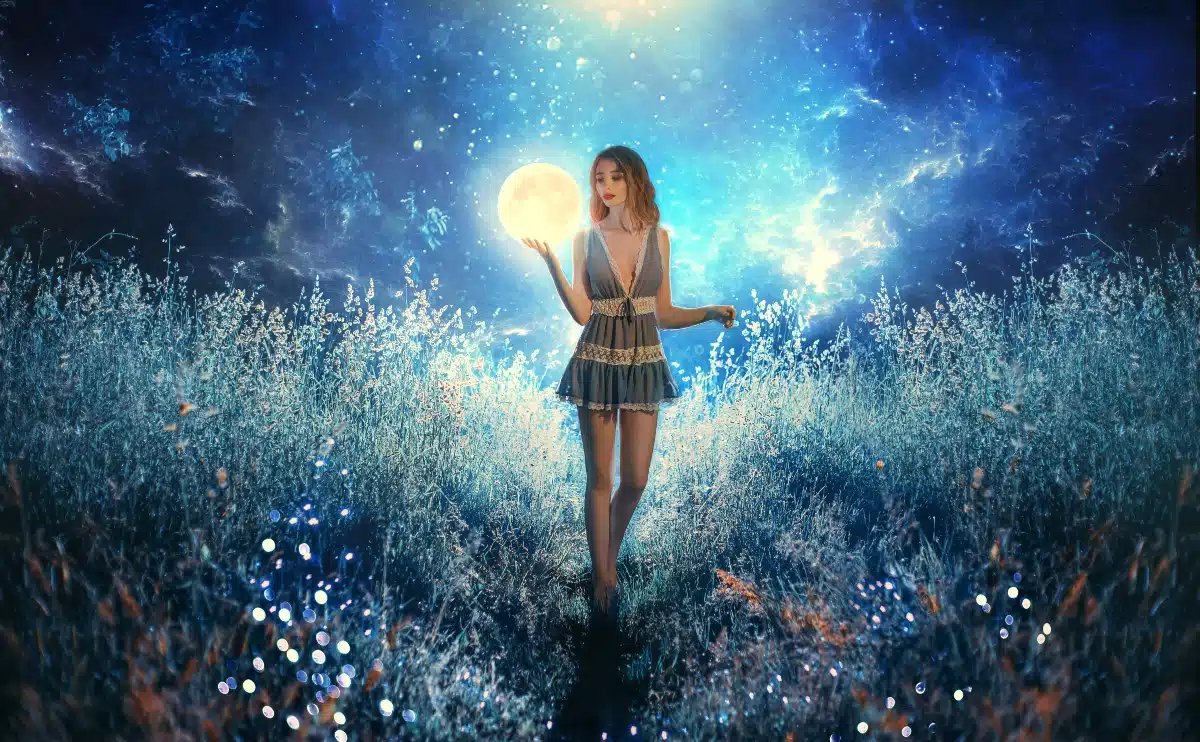
Electrifying Poems About Moonlight
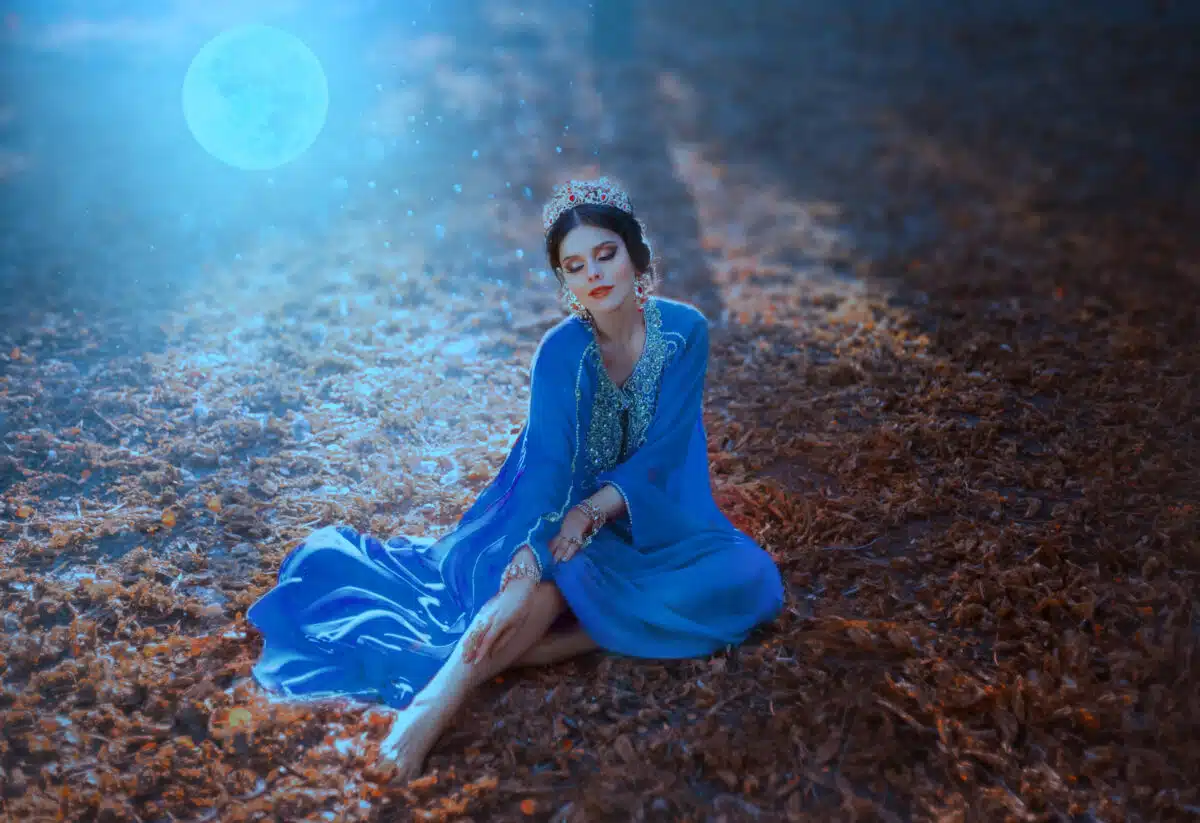
Prepare to be mesmerized by a celestial symphony of words as you immerse yourself in a meticulously curated collection of poems that illuminate the enchanting realm of moonlight.
Delight in the evocative brevity of short poems that capture the ethereal essence of moonlit nights, while also savoring the timeless beauty of classic verses that have stood the test of time.
Step into a poetic sanctuary where moonlight dances on the pages, casting its mystical glow and captivating your imagination.
Get ready to be spellbound by the lyrical melodies that illuminate the night sky and evoke a sense of wonder and reverence for the moon’s luminous embrace.
Keep reading and enjoy!
My #1 Favorite Poem About Moonlight
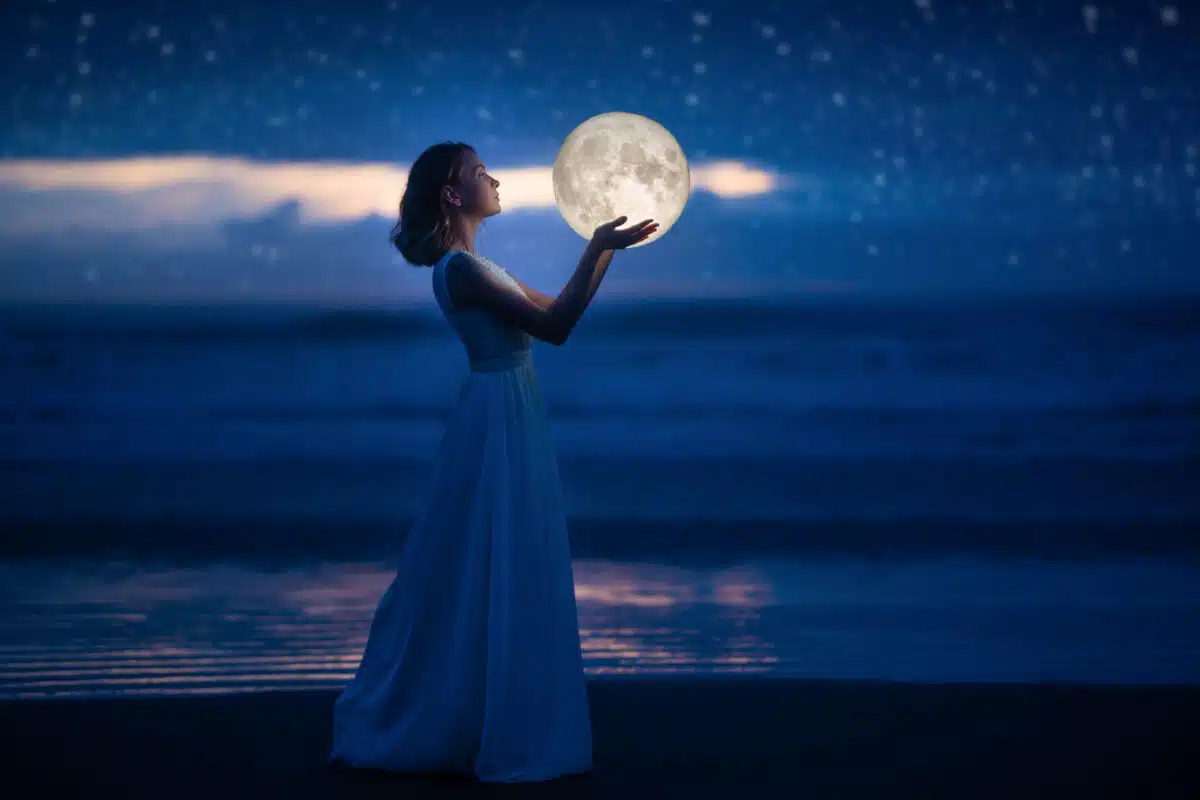
“When Moonlight Falls” by Hilda Conkling
When moonlight falls on the water,
It is like fingers touching the chords of a harp
On a misty day.
When moonlight strikes the water
I cannot get it into my poem—
I only hear the tinkle of ripplings of light.
When I see the water’s fingers and the moon’s rays
Intertwined,
I think of all the words I love to hear
And try to find words white enough
For such shining.
Short Poems About Moonlight
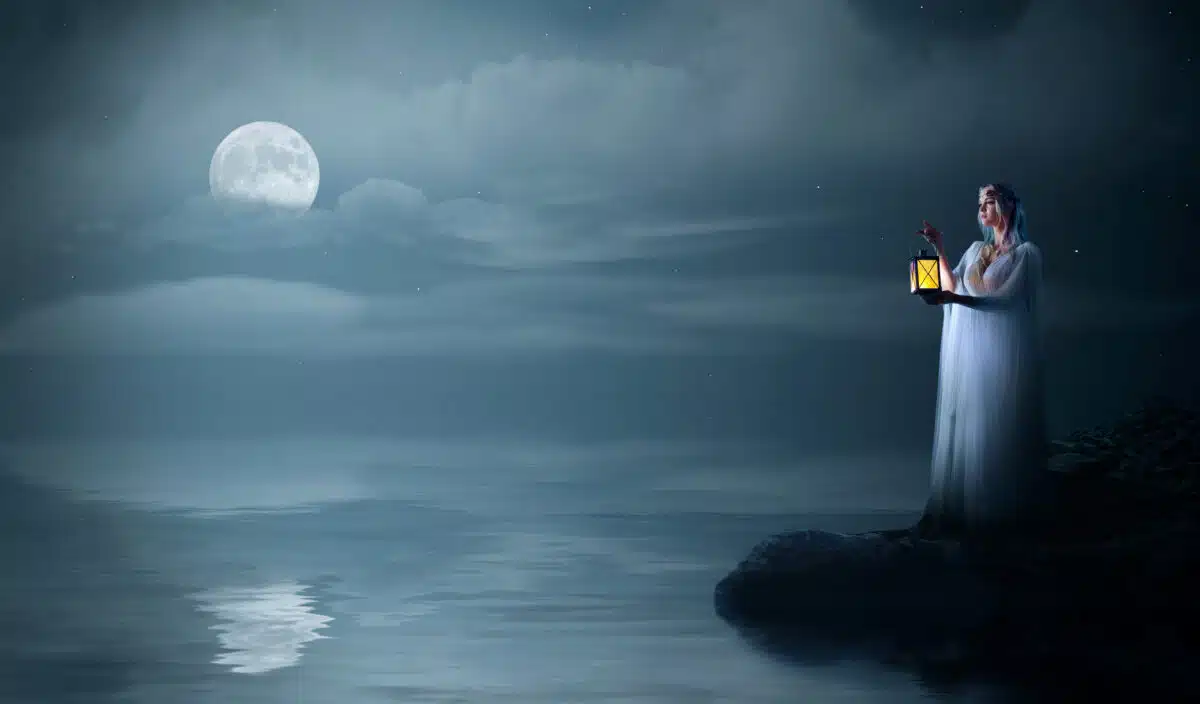
“Autumn River Song” by Li Po
The moon shimmers in green water.
White herons fly through the moonlight.
The young man hears a girl gathering water-chestnuts:
into the night, singing, they paddle home together.
“The Difference” by Thomas Hardy
I.
Sinking down by the gate I discern the thin moon,
And a blackbird tries over old airs in the pine,
But the moon is a sorry one, sad the bird’s tune,
For this spot is unknown to that Heartmate of mine.
II.
Did my Heartmate but haunt here at times such as now,
The song would be joyous and cheerful the moon;
But she will see never this gate, path, or bough,
Nor I find a joy in the scene or the tune.
“Dirge” by Thomas Lovell Beddoes
We do lie beneath the grass
In the moonlight, in the shade
Of the yew-tree. They that pass
Hear us not. We are afraid
They would envy our delight,
In our graves by glow-worm night.
Come follow us, and smile as we;
We sail to the rock in the ancient waves,
Where the snow falls by thousands into the sea,
And the drown’d and the shipwreck’d have happy graves.
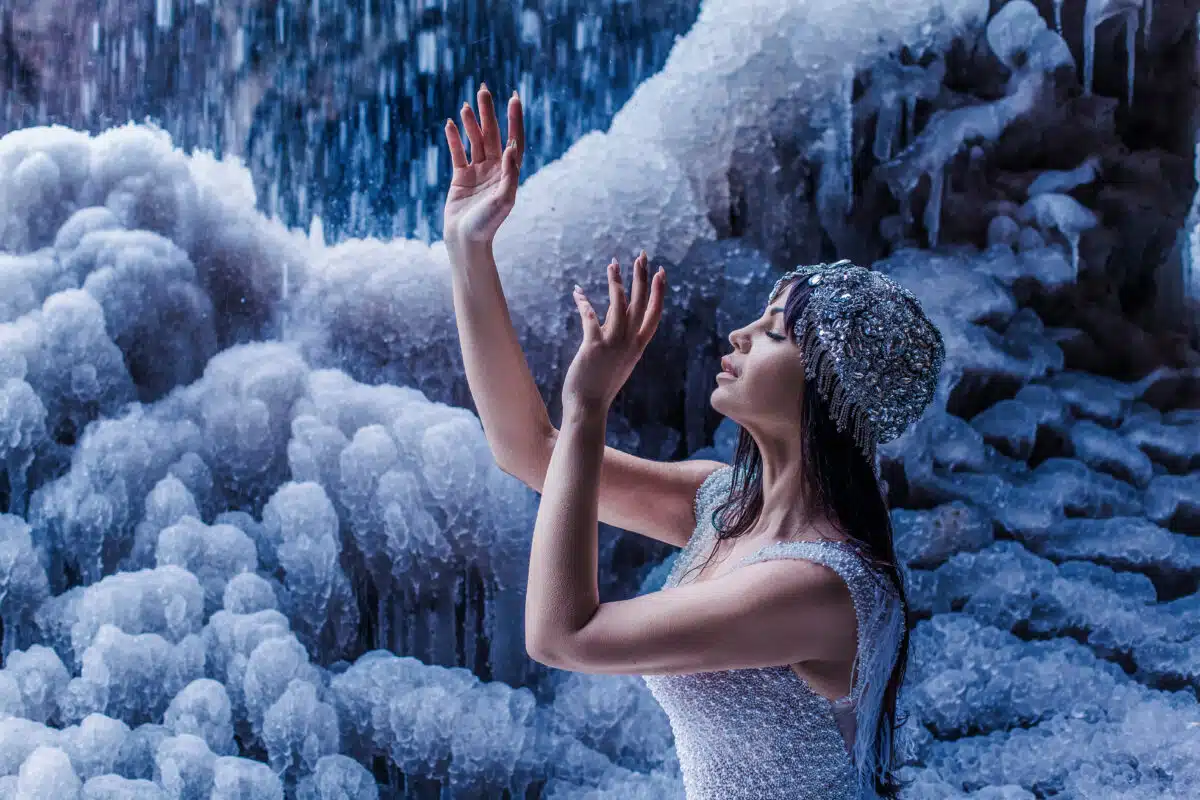
“Opal” by Amy Lowell
You are ice and fire,
The touch of you burns my hands like snow.
You are cold and flame.
You are the crimson of amaryllis,
The silver of moon-touched magnolias.
When I am with you,
My heart is a frozen pond
Gleaming with agitated torches.
“Moonlight” by Walter De La Mare
The far moon maketh lovers wise
In her pale beauty trembling down,
Lending curved cheeks, dark lips, dark eyes,
A strangeness not her own.
And, though they shut their lids to kiss,
In starless darkness peace to win,
Even on that secret world from this
Her twilight enters in.
“Lacquer Prints: By Messenger” by Amy Lowell
One night
When there was a clear moon,
I sat down
To write a poem
About maple trees.
But the dazzle of moonlight
In the ink
Blinded me,
And I could only write
What I remembered.
Therefore, on the wrapping of my poem
I have inscribed your name.
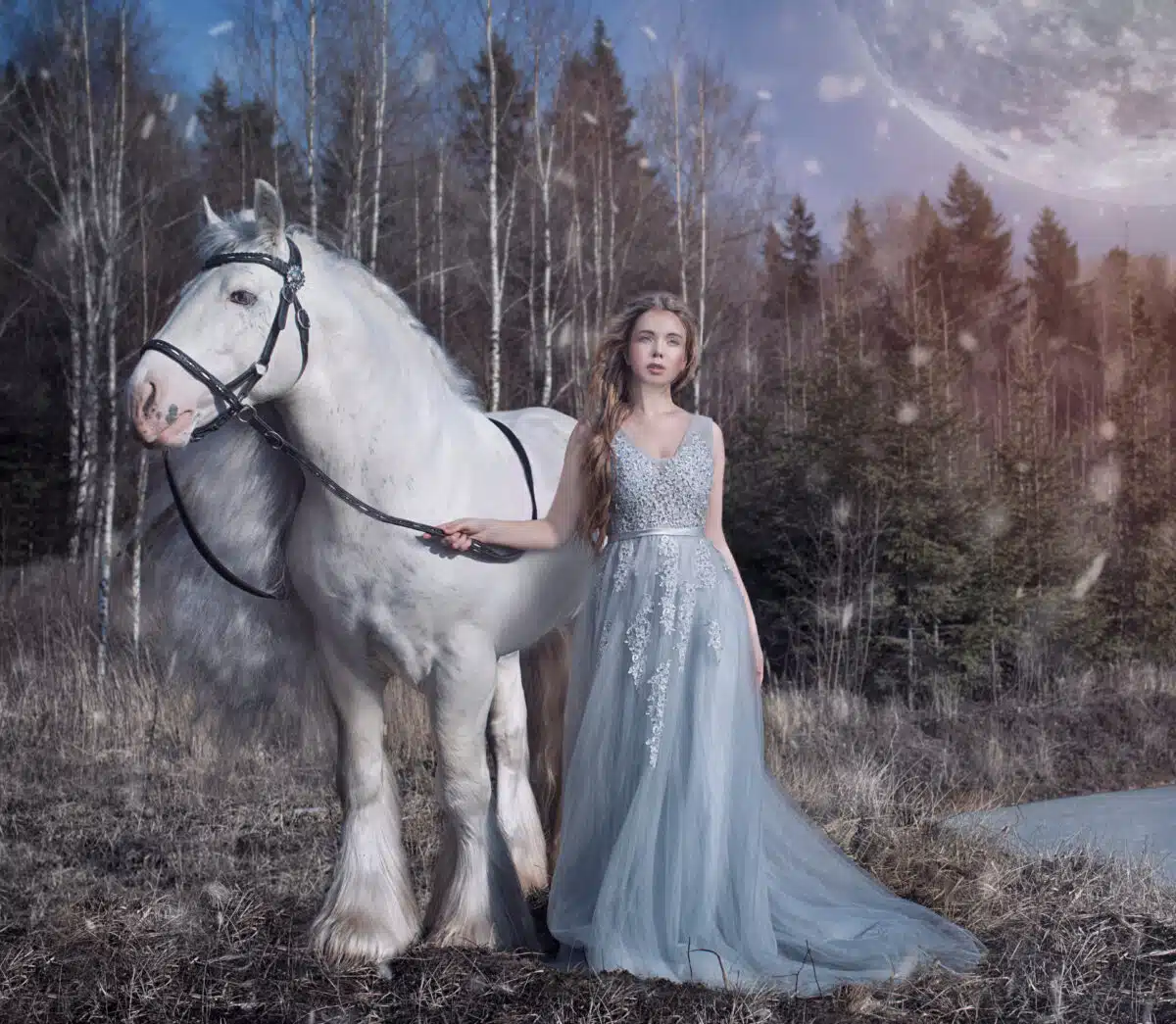
“Silver” by Walter De La Mare
Slowly, silently, now the moon
Walks the night in her silver shoon:
This way, and that, she peers and sees
Silver fruit upon silver trees;
One by one the casements catch
Her beams beneath the silvery thatch;
Couched in his kennel, like a log,
With paws of silver sleeps the dog
From their shadowy cote the white breasts peep
Of doves in a silver-feathered sleep;
A harvest mouse goes scampering by,
With silver claws and silver eye;
And moveless fish in the water gleam
By silver reeds in a silver stream.
“Historical Rhymes 4” by Unknown
One moonshiny night
As I sat high,
Waiting for one
To come by;
The boughs did bend,
My heart did ache
To see what hole the fox did make.
“A Mood” by George MacDonald
My thoughts are like fire-flies, pulsing in moonlight;
My heart like a silver cup, filled with red wine;
My soul a pale gleaming horizon, whence soon light
Will flood the gold earth with a torrent divine.
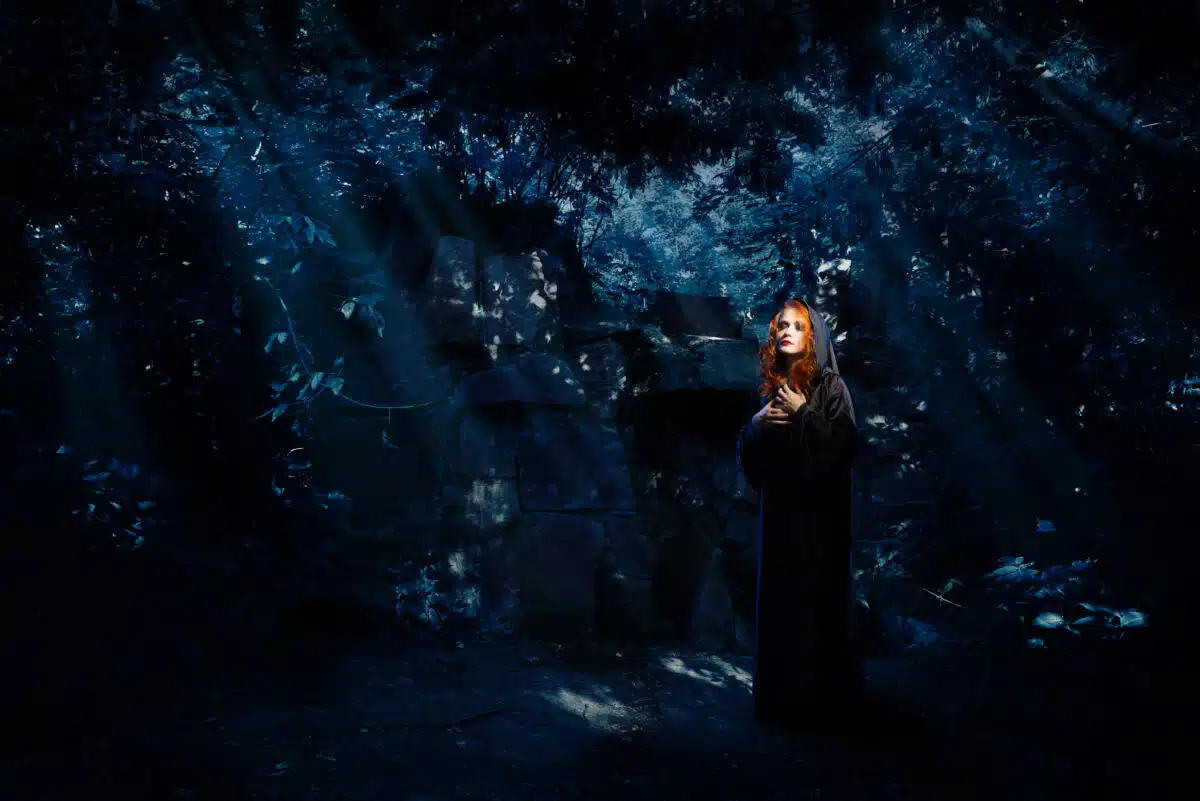
“Shagbark Hickory” by Carl Sandburg
In the moonlight under a shag-bark hickory tree
Watching the yellow shadows melt in hoof-pools,
Listening to the yes and the no of a woman’s hands,
I kept my guess why the night was glad.
The night was lit with a woman’s eyes.
The night was crossed with a woman’s hands,
The night kept humming an undersong.
“Moonlight” by Kathryn White Ryan
It has covered the earth as this sheet my knee
Where my body lies like a reed in snow.
It has altered my room to a satin tomb.
It has made of my soul a silver flute—
A silver flute in a white case, mute;
A silver flute filled with prisoned song,
Long shrill song for your lips to free.
“Ghosts” by Richard Kendall Munkittrick
Out in the misty moonlight
The first snowflakes I see,
As they frolic among the leafless
Limbs of the apple-tree.
Faintly they seem to whisper,
As round the boughs they wing:
“We are the ghosts of the blossoms
That died in the early spring.”
Famous Poems About Moonlight
“Evening Star” by Edgar Allan Poe
‘Twas noontide of summer,
And mid-time of night;
And stars, in their orbits,
Shone pale, thro’ the light
Of the brighter, cold moon,
‘Mid planets her slaves,
Herself in the Heavens,
Her beam on the waves.
I gazed awhile
On her cold smile;
Too cold–too cold for me–
There pass’d, as a shroud,
A fleecy cloud,
And I turned away to thee,
Proud Evening Star,
In thy glory afar,
And dearer thy beam shall be;
For joy to my heart
Is the proud part
Thou bearest in Heaven at night,
And more I admire
Thy distant fire,
Than that colder, lowly light.
“The Moon” by Robert Louis Stevenson
The moon has a face like the clock in the hall;
She shines on thieves on the garden wall,
On streets and fields and harbour quays,
And birdies asleep in the forks of the trees.
The squalling cat and the squeaking mouse,
The howling dog by the door of the house,
The bat that lies in bed at noon,
All love to be out by the light of the moon.
But all of the things that belong to the day
Cuddle to sleep to be out of her way;
And flowers and children close their eyes
Till up in the morning the sun shall arise.
“The Moon” by Oliver Herford
The Moon is like a big round cheese
That shines above the garden trees,
And like a cheese grows less each night,
As though some one had had a bite.
The Mouse delights to nibble cheese,
The Dog bites anything he sees–
But how could they bite off the Moon
Unless they went in a balloon?
And Human People, when they eat
They think it rude to bite their meat,
They use a Knife or Fork or Spoon;
Who is it then that bites the moon?
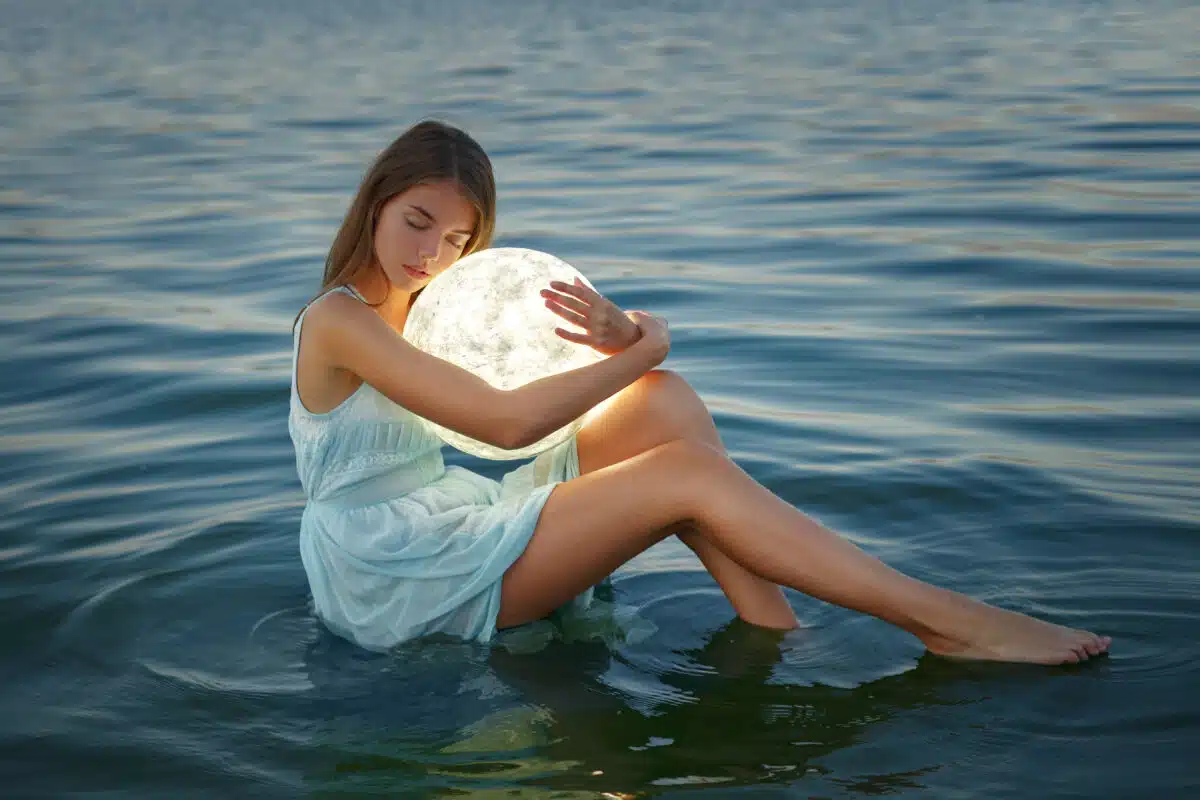
“The Moon to the Sun” by Alice Christiana Thompson Meynell
As the full moon shining there
To the sun that lighteth her
Am I unto thee for ever,
O my secret glory-giver!
O my light, I am dark but fair,
Black but fair.
Shine, Earth loves thee! And then shine
And be loved through thoughts of mine.
All thy secrets that I treasure
I translate them at my pleasure.
I am crowned with glory of thine.
Thine, not thine.
I make pensive thy delight,
And thy strong gold silver-white.
Though all beauty of nine thou makest,
Yet to earth which thou forsakest
I have made thee fair all night,
Day all night.
“A Shropshire Lad, IX” by A. E. Housman
On moonlit heath and lonesome bank
The sheep beside me graze;
And yon the gallows used to clank
Fast by the four cross ways.
A careless shepherd once would keep
The flock by moonlight there,
And high amongst the glimmering sheep
The dead man stood on air.
They hang us now in Shrewsbury jail:
The whistles blow forlorn,
And trains all night groan on the rail
To men that die at morn.
There sleeps in Shrewsbury jail to-night,
Or wakes, as may betide,
A better lad, if things went right,
Than most that sleep outside.
And naked to the hangman’s noose
The morning clocks will ring
A neck God made for other use
Than strangling in a string.
And sharp the link of life will snap,
And dead on air will stand
Heels that held up as straight a chap
As treads upon the land.
So here I’ll watch the night and wait
To see the morning shine,
When he will hear the stroke of eight
And not the stroke of nine;
And wish my friend as sound a sleep
As lads’ I did not know,
That shepherded the moonlit sheep
A hundred years ago.
“The Moon” by Henry David Thoreau
The full-orbed moon with unchanged ray
Mounts up the eastern sky,
Not doomed to these short nights for aye,
But shining steadily.
She does not wane, but my fortune,
Which her rays do not bless,
My wayward path declineth soon,
But she shines not the less.
And if she faintly glimmers here,
And paled is her light,
Yet alway in her proper sphere
She’s mistress of the night.
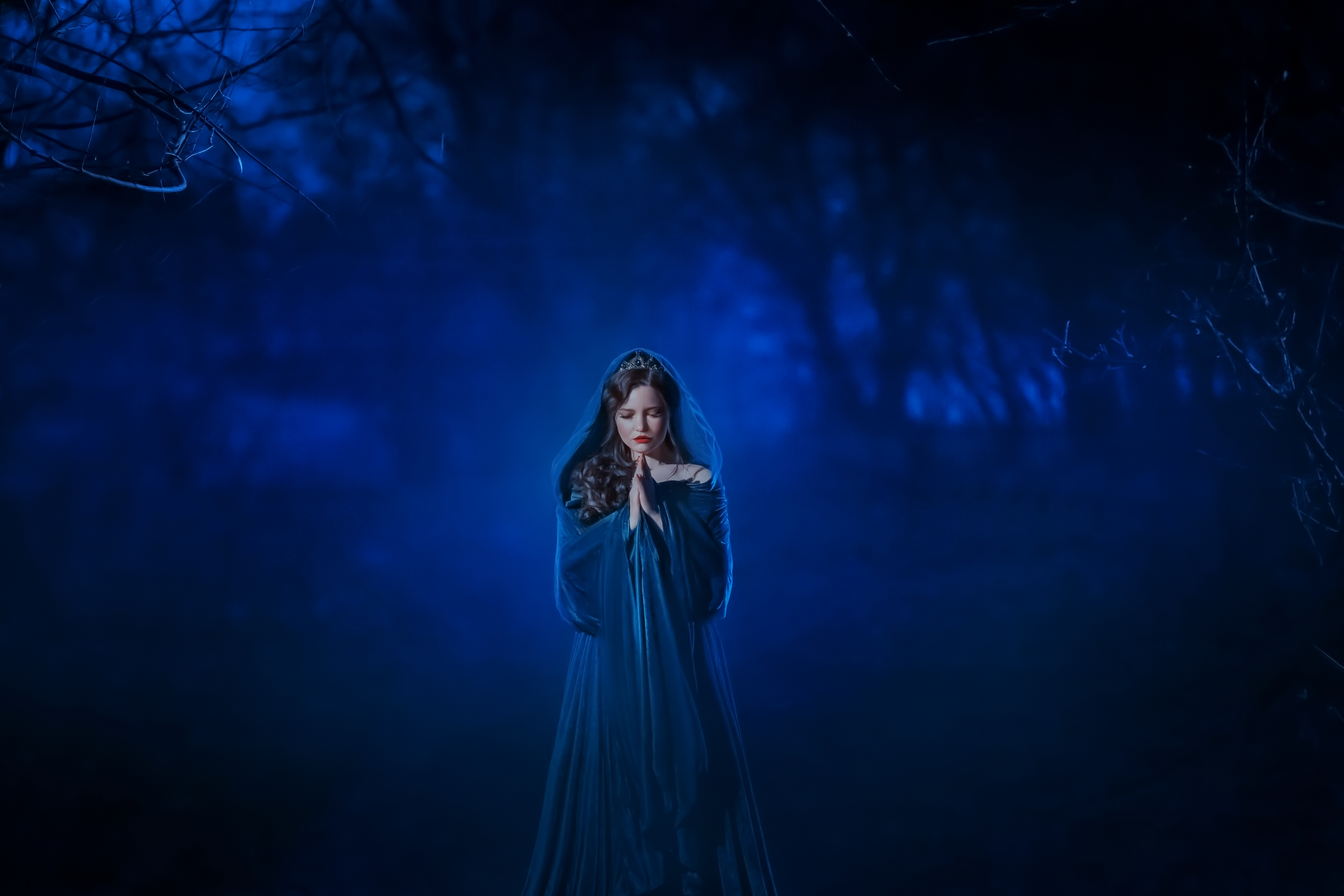
“Halloween” by Madison Julius Cawein
It was down in the woodland on last Hallowe’en,
Where silence and darkness had built them a lair,
That I felt the dim presence of her, the unseen,
And heard her still step on the hush-haunted air.
It was last Hallowe’en in the glimmer and swoon
Of mist and of moonlight, where once we had sinned,
That I saw the gray gleam of her eyes in the moon,
And hair, like a raven, blown wild on the wind.
It was last Hallowe’en where starlight and dew
Made mystical marriage on flower and leaf,
That she led me with looks of a love, that I knew
Was dead, and the voice of a passion too brief.
It was last Hallowe’en in the forest of dreams,
Where trees are eidolons and flowers have eyes,
That I saw her pale face like the foam of far streams,
And heard, like the night-wind, her tears and her sighs.
It was last Hallowe’en, the haunted, the dread,
In the wind-tattered wood, by the storm-twisted pine,
That I, who am living, kept tryst with the dead,
And clasped her a moment who once had been mine.
“Evening Song of Senlin” by Conrad Potter Aiken
It is moonlight. Alone in the silence
I ascend my stairs once more,
While waves, remote in a pale blue starlight,
Crash on a white sand shore.
It is moonlight. The garden is silent.
I stand in my room alone.
Across my wall, from the far-off moon,
A rain of fire is thrown . . .
There are houses hanging above the stars,
And stars hung under a sea:
And a wind from the long blue vault of time
Waves my curtain for me . . .
I wait in the dark once more,
Swung between space and space:
Before my mirror I lift my hands
And face my remembered face.
Is it I who stand in a question here,
Asking to know my name? . . .
It is I, yet I know not whither I go,
Nor why, nor whence I came.
It is I, who awoke at dawn
And arose and descended the stair,
Conceiving a god in the eye of the sun,
In a woman’s hands and hair.
It is I whose flesh is gray with the stones
I builded into a wall:
With a mournful melody in my brain
Of a tune I cannot recall . . .
There are roses to kiss: and mouths to kiss;
And the sharp-pained shadow of death.
I remember a rain-drop on my cheek,
A wind like a fragrant breath . . .
And the star I laugh on tilts through heaven;
And the heavens are dark and steep . . .
I will forget these things once more
In the silence of sleep.
“A Shropshire Lad, XXXVI” by A. E. Housman
White in the moon the long road lies,
The moon stands blank above;
White in the moon the long road lies
That leads me from my love.
Still hangs the hedge without a gust,
Still, still the shadows stay:
My feet upon the moonlit dust
Pursue the ceaseless way.
The world is round, so travellers tell,
And straight though reach the track,
Trudge on, trudge on, ’twill all be well,
The way will guide one back.
But ere the circle homeward hies
Far, far must it remove:
White in the moon the long road lies
That leads me from my love.
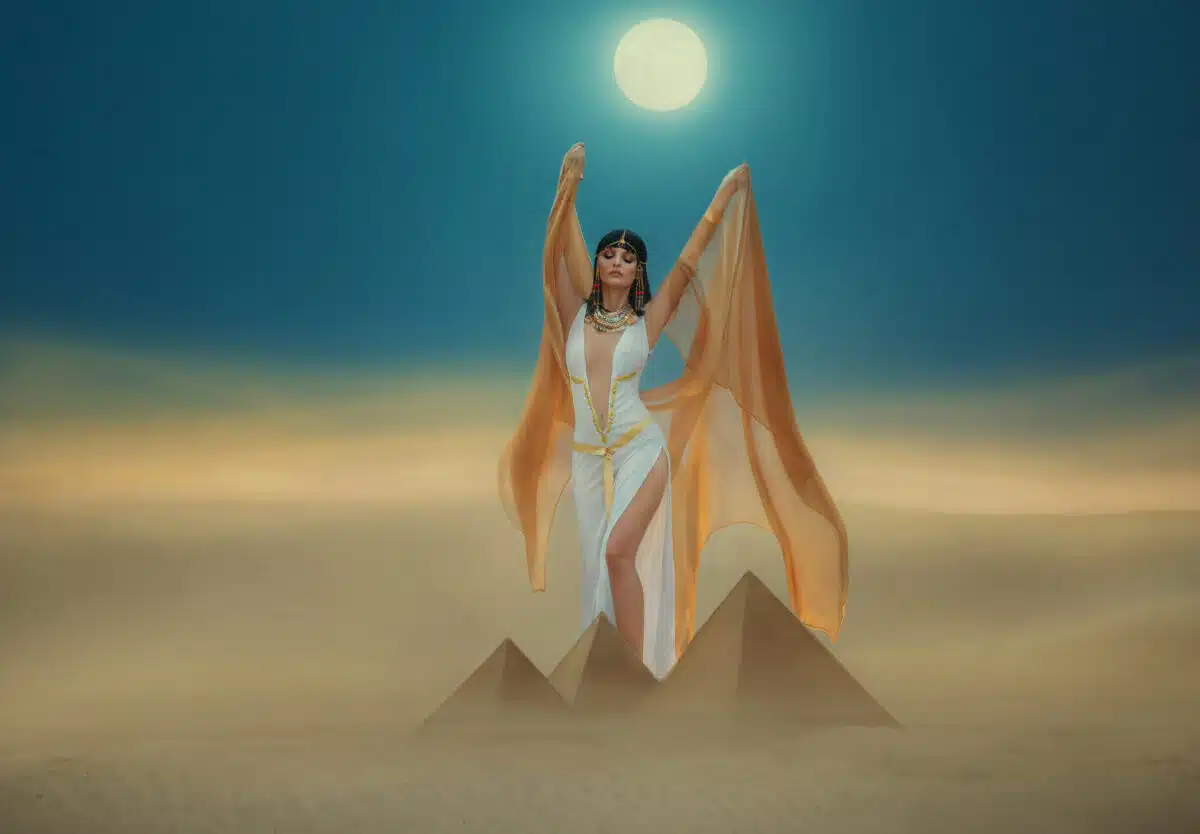
“Daylight and Moonlight” by Henry Wadsworth Longfellow
In broad daylight, and at noon,
Yesterday I saw the moon
Sailing high, but faint and white,
As a school-boy’s paper kite.
In broad daylight, yesterday,
I read a Poet’s mystic lay;
And it seemed to me at most
As a phantom, or a ghost.
But at length the feverish day
Like a passion died away,
And the night, serene and still,
Fell on village, vale, and hill.
Then the moon, in all her pride,
Like a spirit glorified,
Filled and overflowed the night
With revelations of her light.
And the Poet’s song again
Passed like music through my brain;
Night interpreted to me
All its grace and mystery.
“Fragment.” by Frances Anne Kemble (Fanny)
It was the harvest time: the broad, bright moon
Was at her full, and shone upon the fields
Where we had toiled the livelong day, to pile
In golden sheaves the earth’s abundant treasure.
The harvest task had given place to song
And merry dance; and these in turn were chased
By legends strange, and wild, unearthly tales
Of elves, and gnomes, and fairy sprites, that haunt
The woods and caves; where they do sleep all day,
And then come forth i’ the witching hour of night,
To dance by moonlight on the green thick sward.
The speaker was an aged villager,
In whom his oft-told tale awoke no fears,
Such as he filled his gaping listeners with.
Nor ever was there break in his discourse,
Save when with gray eyes lifted to the moon,
He conjured from the past strange instances
Of kidnapp’d infants, from their cradles snatch’d,
And changed for elvish sprites; of blights, and blains,
Sent on the cattle by the vengeful fairies;
Of blasted crops, maim’d limbs, and unsound minds,
All plagues inflicted by these angered sprites.
Then would he pause, and wash his story down
With long-drawn draughts of amber ale; while all
The rest came crowding under the wide oak tree,
Piling the corn sheaves closer round the ring,
Whispering and shaking, laughing too, with fear;
And ever, if an acorn bobb’d from the boughs,
Or grasshopper from out the stubble chirrupp’d,
Blessing themselves from Robin Goodfellow!
“The Romanza.” by Madison Julius Cawein
In a kingdom of mist and moonlight,
Or ever the world was known,
Past leagues of unsailed water,
There reigned a king with a daughter
That shone like a starry stone.
The day grew out o’ the moonlight;
But never a day was there.
The king was wise as hoary,
And his daughter, like the glory
Of seven kingdoms, fair.
And the night dimmed over the moonlight, –
And ever the mist was gray, –
With slips of dull stars, bluer
Where the princess met her wooer,
A page like the month o’ May.
In her eyes the mist, and the moonlight
In hair of a crumpled gold;
By day they wooed a-hawking,
A-hawking laughed, a-mocking
The good, white king and old.
On the sea the mist, and the moonlight
Poured pale to the lilies’ tips; –
At eve, when the hawks were feeding,
In courts to the kennels leading,
He kissed her mouth and lips.
On towers the mist, and the moonlight
On a dead face staring up; –
His kingly couch was ready,
But and her hand was steady
Giving the poisoned cup.
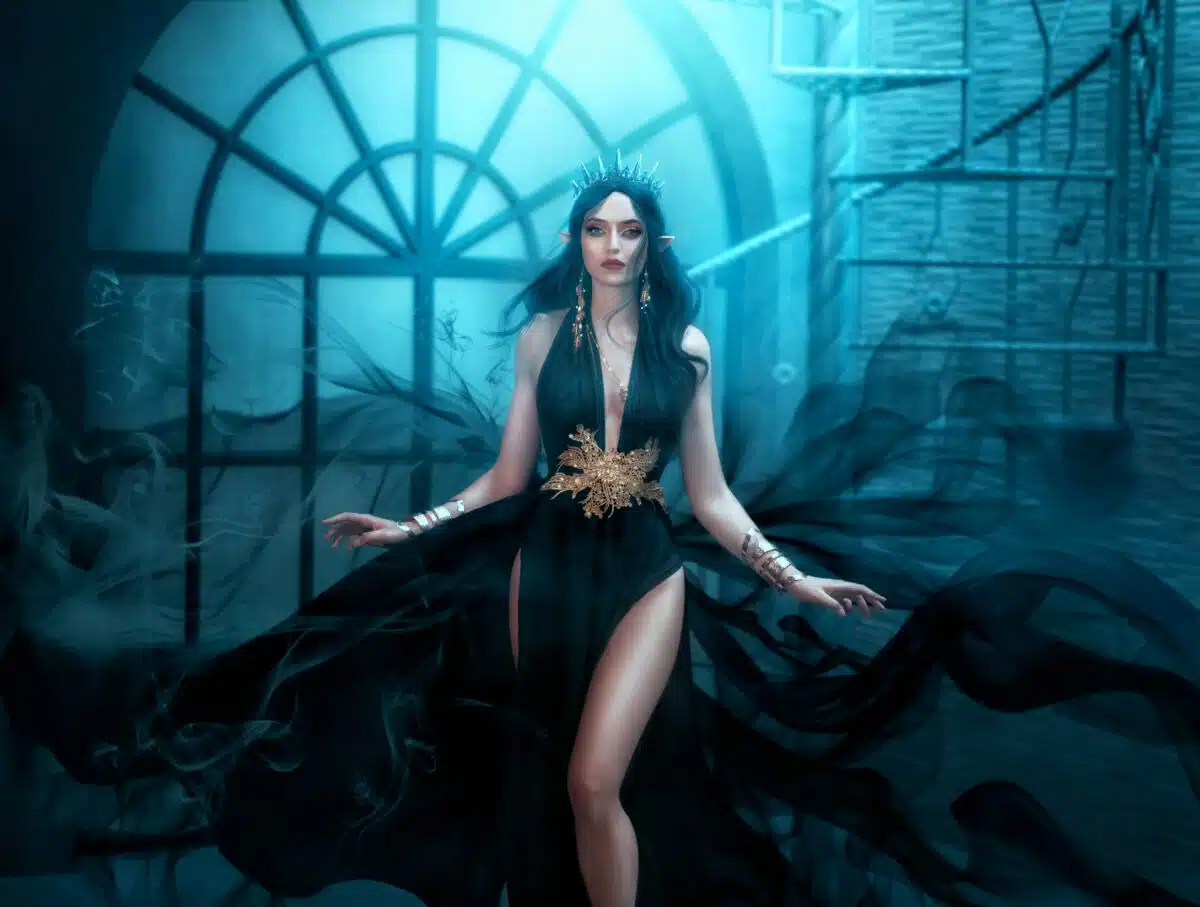
“A Dream” by William Allingham
I heard the dogs howl in the moonlight night;
I went to the window to see the sight;
All the Dead that ever I knew
Going one by one and two by two.
On they pass’d, and on they pass’d;
Townsfellows all, from first to last;
Born in the moonlight of the lane,
Quench’d in the heavy shadow again.
Schoolmates, marching as when they play’d
At soldiers once, but now more staid;
Those were the strangest sight to me
Who were drown’d, I knew, in the awful sea.
Straight and handsome folk, bent and weak, too;
Some that I loved, and gasp’d to speak to;
Some but a day in their churchyard bed;
Some that I had not known were dead.
A long, long crowd, where each seem’d lonely,
Yet of them all there was one, one only,
Raised a head or look’d my way;
She linger’d a moment, she might not stay.
How long since I saw that fair pale face!
Ah! Mother dear! might I only place
My head on thy breast, a moment to rest,
While thy hand on my tearful cheek were prest!
On, on, a moving bridge they made
Across the moon-stream, from shade to shade,
Young and old, women and men;
Many long-forgot, but remembered then,
And first there came a bitter laughter;
A sound of tears a moment after;
And then a music so lofty and gay,
That eve morning, day by day,
I strive to recall it if I may.
“Read by Moonlight” by Thomas Hardy
I paused to read a letter of hers
By the moon’s cold shine,
Eyeing it in the tenderest way,
And edging it up to catch each ray
Upon her light-penned line.
I did not know what years would flow
Of her life’s span and mine
Ere I read another letter of hers
By the moon’s cold shine!
I chance now on the last of hers,
By the moon’s cold shine;
It is the one remaining page
Out of the many shallow and sage
Whereto she set her sign.
Who could foresee there were to be
Such letters of pain and pine
Ere I should read this last of hers
By the moon’s cold shine!
“Ingratitude.” by Charles Sangster
Full on the wave the moonlight weeps,
To quiet its weary breast;
Cruelly cold the mad wave leaps,
With the moonshine on its crest;
Or with scowl, or growl, to the shore it creeps,
And sinks to its selfish rest.
Full on yon man-brute smiles the wife,
To gladden his turbid breast;
Savagely stern he seeks the life
Where he erewhile sought for zest;
With a curse, or worse, he ends the strife,
And sinks to his drunken rest.
Sea! has the moon no charms for thee
That can touch thy cruel breast?
Man! cannot woman’s charity
Give ease to thy soul oppressed?
Thou shalt flee, O sea! the moon’s witchery,
Till man has his final rest!
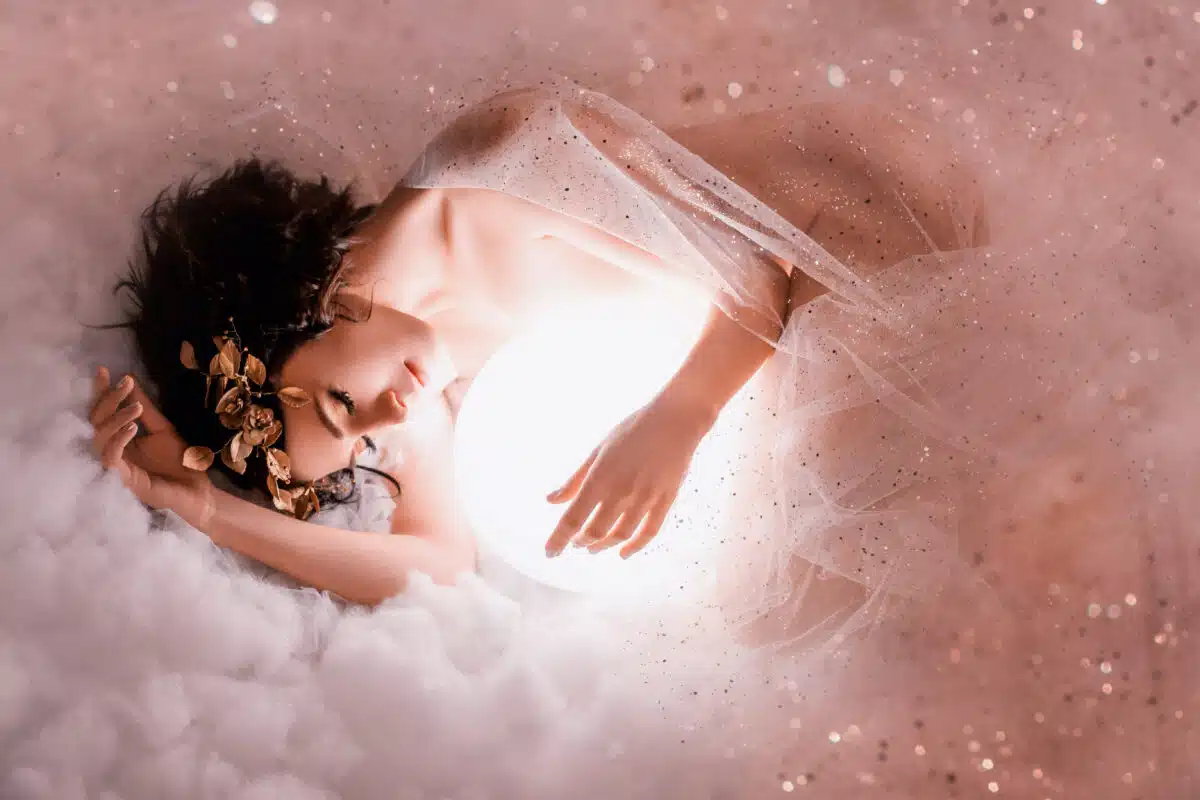
“Sleepyhead” by Walter De La Mare
As I lay awake in the white moonlight
I heard a faint singing in the wood,
“Out of bed,
Sleepyhead,
Put your white foot, now;
Here are we
Beneath the tree
Singing round the root now.”
I looked out of window, in the white moonlight,
The leaves were like snow in the wood –
“Come away,
Child, and play
Light with the gnomies;
In a mound,
Green and round,
That’s where their home is.
“Honey sweet,
Curds to eat,
Cream and frumenty,
Shells and beads,
Poppy seeds,
You shall have plenty.”
But, as soon as I stooped in the dim moonlight
To put on my stocking and my shoe,
The sweet shrill singing echoed faintly away,
And the grey of the morning peeped through,
And instead of the gnomies there came a red robin
To sing of the buttercups and dew.
“The City in Moonlight” by Richard Le Gallienne
Dear city in the moonlight dreaming,
How changed and lovely is your face;
Where is the sordid busy scheming
That filled all day the market-place?
Was it but fancy that a rabble
Of money-changers bought and sold,
Filling with sacrilegious babble
This temple-court of solemn gold?
Ah no, poor captive-slave of Croesus,
His bond-maid all the toiling day,
You, like some hunted child of Jesus,
Steal out beneath the moon to pray.
“Moonlight” by Henry Wadsworth Longfellow
As a pale phantom with a lamp
Ascends some ruin’s haunted stair,
So glides the moon along the damp
Mysterious chambers of the air.
Now hidden in cloud, and now revealed,
As if this phantom, full of pain,
Were by the crumbling walls concealed,
And at the windows seen again.
Until at last, serene and proud
In all the splendor of her light,
She walks the terraces of cloud,
Supreme as Empress of the Night.
I look, but recognize no more
Objects familiar to my view;
The very pathway to my door
Is an enchanted avenue.
All things are changed. One mass of shade,
The elm-trees drop their curtains down;
By palace, park, and colonnade
I walk as in a foreign town.
The very ground beneath my feet
Is clothed with a diviner air;
White marble paves the silent street
And glimmers in the empty square.
Illusion! Underneath there lies
The common life of every day;
Only the spirit glorifies
With its own tints the sober gray.
In vain we look, in vain uplift
Our eyes to heaven, if we are blind,
We see but what we have the gift
Of seeing; what we bring we find.
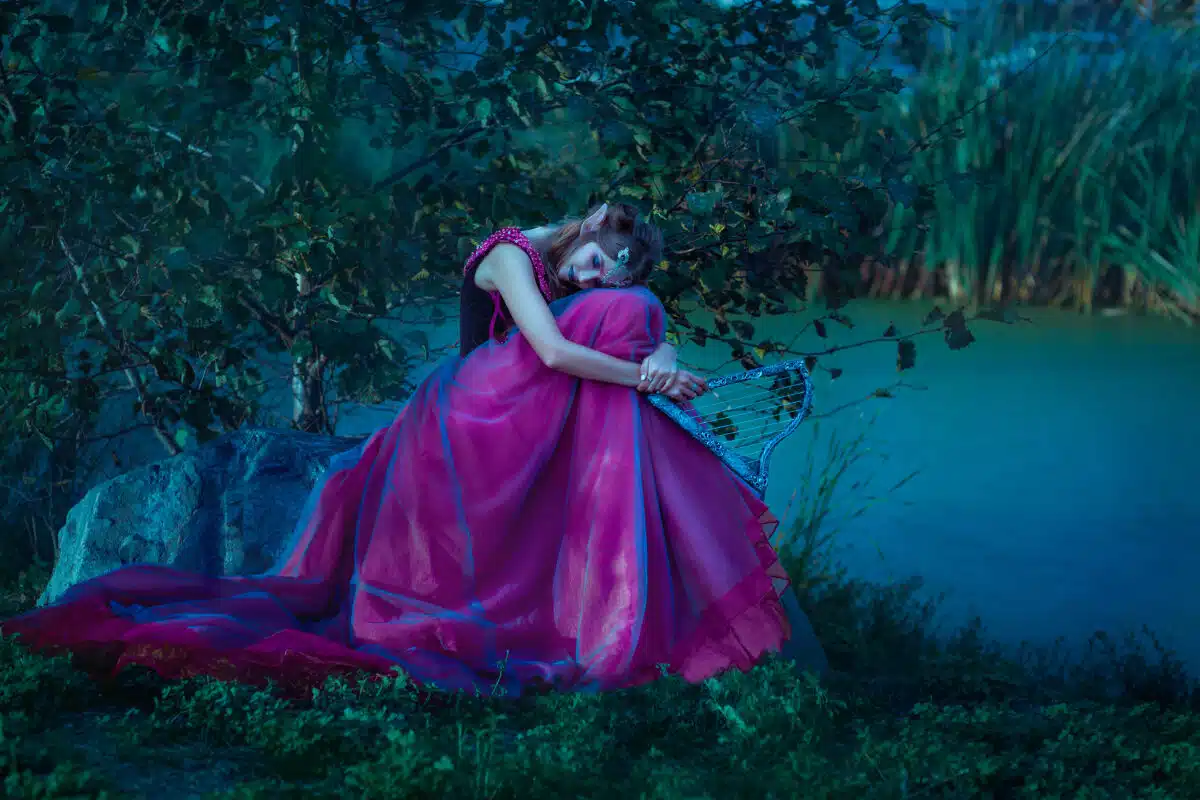
“Orkney Lullaby” by Eugene Field
A moonbeam floateth from the skies,
Whispering, “Heigho, my dearie!
I would spin a web before your eyes,–
A beautiful web of silver light,
Wherein is many a wondrous sight
Of a radiant garden leagues away,
Where the softly tinkling lilies sway,
And the snow-white lambkins are at play,–
Heigho, my dearie!”
A brownie stealeth from the vine
Singing, “Heigho, my dearie!
And will you hear this song of mine,–
A song of the land of murk and mist
Where bideth the bud the dew hath kist?
Then let the moonbeam’s web of light
Be spun before thee silvery white,
And I shall sing the livelong night,–
Heigho, my dearie!”
The night wind speedeth from the sea,
Murmuring, “Heigho, my dearie!
I bring a mariner’s prayer for thee;
So let the moonbeam veil thine eyes,
And the brownie sing thee lullabies;
But I shall rock thee to and fro,
Kissing the brow he loveth so,
And the prayer shall guard thy bed, I trow,–
Heigho, my dearie!”
“Song” by James Russell Lowell
O, moonlight deep and tender,
A year and more agone,
Your mist of golden splendor
Round my betrothal shone!
O, elm-leaves dark and dewy,
The very same ye seem,
The low wind trembles through ye,
Ye murmur in my dream!
O, river, dim with distance,
Flow thus forever by,
A part of my existence
Within your heart doth lie!
O, stars, ye saw our meeting,
Two beings and one soul,
Two hearts so madly beating
To mingle and be whole!
O, happy night, deliver
Her kisses back to me,
Or keep them all, and give her
A blissful dream of me!
“Song” by Percy Bysshe Shelley
Ah! sweet is the moonbeam that sleeps on yon fountain,
And sweet the mild rush of the soft-sighing breeze,
And sweet is the glimpse of yon dimly-seen mountain,
‘Neath the verdant arcades of yon shadowy trees.
But sweeter than all was thy tone of affection,
Which scarce seemed to break on the stillness of eve,
Though the time it is past! – yet the dear recollection,
For aye in the heart of thy ─ must live.
Yet he hears thy dear voice in the summer winds sighing,
Mild accents of happiness lisp in his ear,
When the hope-winged moments athwart him are flying,
And he thinks of the friend to his bosom so dear. ─
And thou dearest friend in his bosom for ever
Must reign unalloyed by the fast rolling year,
He loves thee, and dearest one never, Oh! never
Canst thou cease to be loved by a heart so sincere.
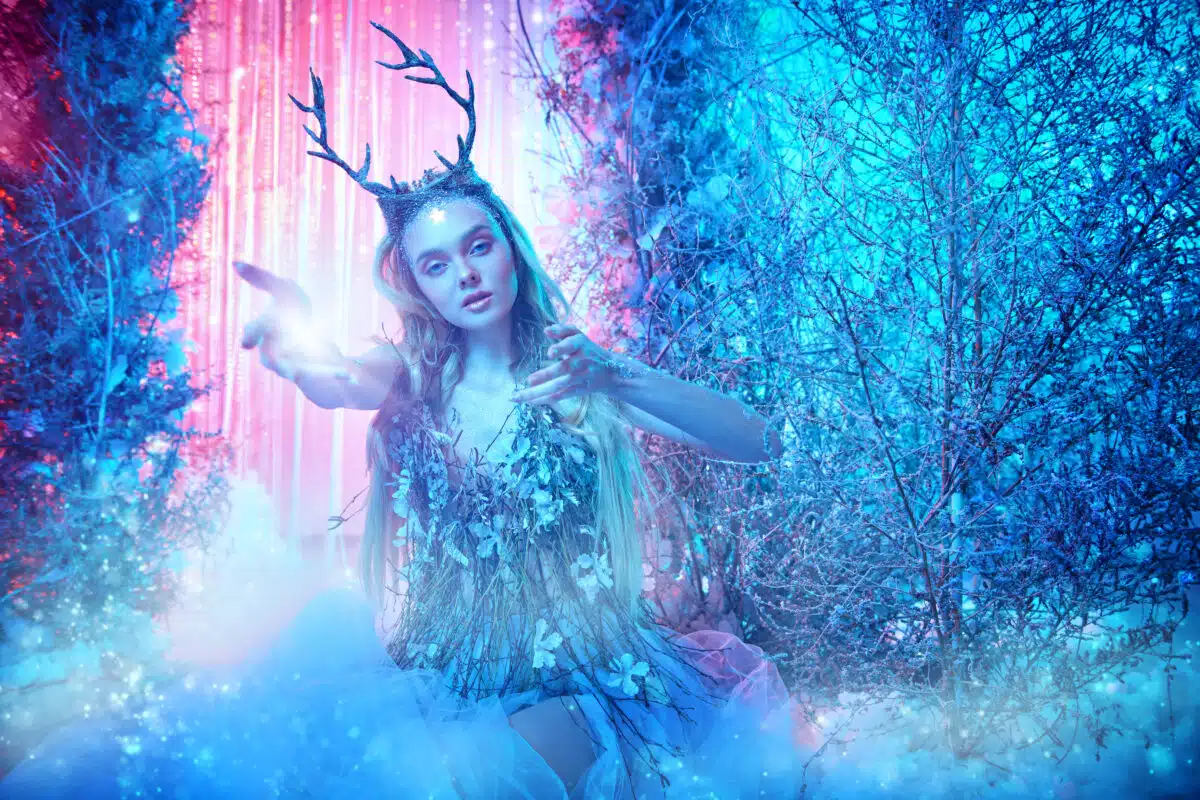
“Death—Divination” by Jessie B. Rittenhouse
Death is like moonlight in a lofty wood,
That pours pale magic through the shadowy leaves;
’T is like the web that some old perfume weaves
In a dim, lonely room where memories brood;
Like snow-chilled wine it steals into the blood,
Spurring the pulse its coolness half reprieves;
Tenderly quickening impulses it gives,
As April winds unsheathe an opening bud.
Death is like all sweet, sense-enfolding things,
That lift us in a dream-delicious trance
Beyond the flickering good and ill of chance;
But most is Death like Music’s buoyant wings,
That bear the soul, a willing Ganymede,
Where joys on joys forevermore succeed.
“August Moonlight” by Richard Le Gallienne
The solemn light behind the barns,
The rising moon, the cricket’s call,
The August night, and you and I—
What is the meaning of it all!
Has it a meaning, after all?
Or is it one of Nature’s lies,
That net of beauty that she casts
Over Life’s unsuspecting eyes?
That web of beauty that she weaves
For one strange purpose of her own,—
For this the painted butterfly,
For this the rose—for this alone!
Strange repetition of the rose,
And strange reiterated call
Of bird and insect, man and maid,—
Is that the meaning of it all?
If it means nothing after all!
And nothing lives except to die—
It is enough—that solemn light
Behind the barns, and you and I.
“The Dream” by Edgar Siegfried Sassoon
I.
Moonlight and dew-drenched blossom, and the scent
Of summer gardens; these can bring you all
Those dreams that in the starlit silence fall:
Sweet songs are full of odours.
While I went
Last night in drizzling dusk along a lane,
I passed a squalid farm; from byre and midden
Came the rank smell that brought me once again
A dream of war that in the past was hidden.
II.
Up a disconsolate straggling village street
I saw the tired troops trudge: I heard their feet.
The cheery Q.M.S. was there to meet
And guide our Company in…
I watched them stumble
Into some crazy hovel, too beat to grumble;
Saw them file inward, slipping from their backs
Rifles, equipment, packs.
On filthy straw they sit in the gloom, each face
Bowed to patched, sodden boots they must unlace,
While the wind chills their sweat through chinks and cracks.
III.
I’m looking at their blistered feet; young Jones
Stares up at me, mud-splashed and white and jaded;
Out of his eyes the morning light has faded.
Old soldiers with three winters in their bones
Puff their damp Woodbines, whistle, stretch their toes:
They can still grin at me, for each of ’em knows
That I’m as tired as they are…
Can they guess
The secret burden that is always mine?—
Pride in their courage; pity for their distress;
And burning bitterness
That I must take them to the accursèd Line.
IV.
I cannot hear their voices, but I see
Dim candles in the barn: they gulp their tea,
And soon they’ll sleep like logs. Ten miles away
The battle winks and thuds in blundering strife.
And I must lead them nearer, day by day,
To the foul beast of war that bludgeons life.
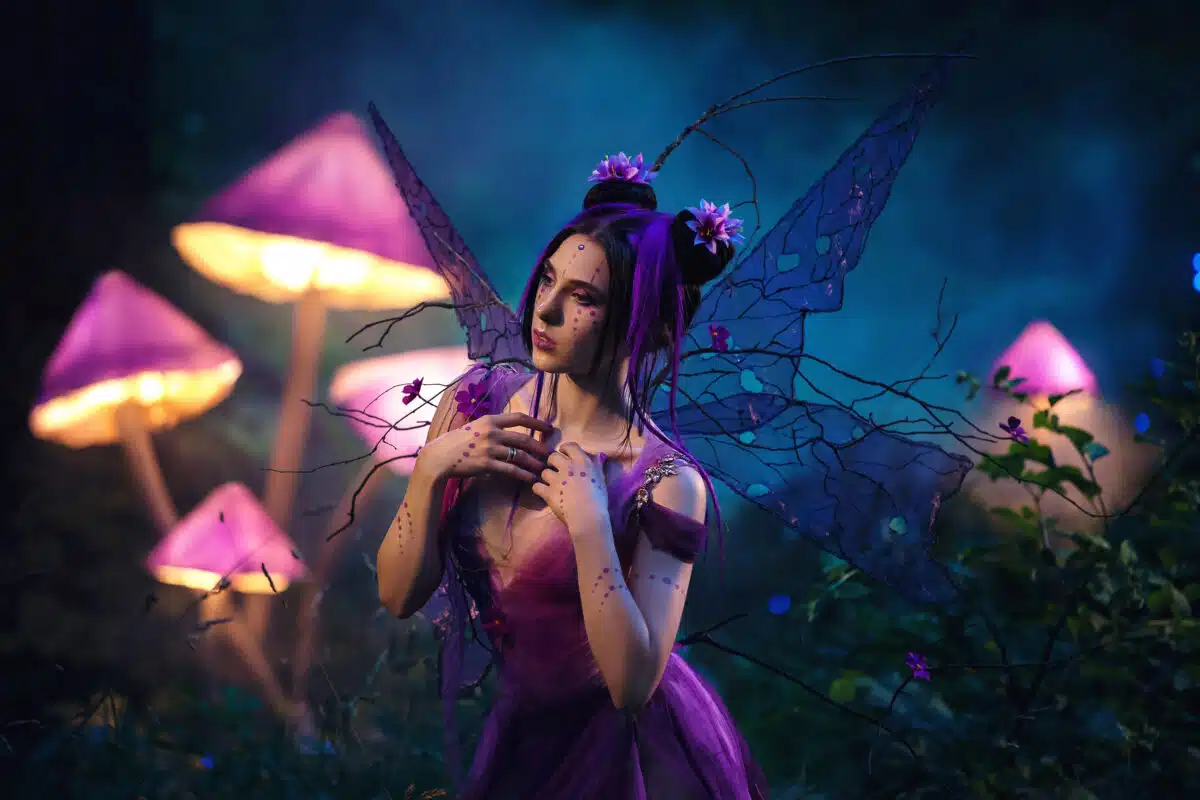
“Moonlight in Italy” by Elizabeth Clementine Kinney
There’s not a breath the dewy leaves to stir;
There ’s not a cloud to spot the sapphire sky;
All Nature seems a silent worshipper:
While saintly Dian, with great, argent eye,
Looks down as lucid from the depths on high
As she to Earth were Heaven’s interpreter;
Each twinkling little star shrinks back, too shy
Its lesser glory to obtrude by her
Who fills the concave and the world with light;
And ah! the human spirit must unite
In such a harmony of silent lays,
Or be the only discord in this night,
Which seems to pause for vocal lips to raise
The sense of worship into uttered praise.
“A Moonlight Ride” by Harriet Eleanor Hamilton-King
Through the land low-lying, fast and free
I ride alone and under the moon;
An empty road that is strange to me,
Yet at every turn remembered soon:
A road like a racecourse, even and wide,
With grassy margins on either side;
In a rapture of blowing air I ride,
With a heart that is beating tune.
Light as on turf the hoof-beats fall,
As on spongy sod as fast and fleet,
For the road is smooth and moist withal,
And the water springs under the horse’s feet;
And to every stride sounds a soft plash yet,
For all the length of the way is wet
With many a runnel and rivulet
That under the moonlight meet.
O surely the water lilies should be
Sunk away and safe folded to rest!
But, no; they are shining open and free,
White and awake on the water’s breast:
On the long and shimmering waterway,
All silver-spread to the full moon’s ray,
The shallow dykes that straggle and stray
With their floating fringes drest.
The road will flow winding and winding away
Through the sleeping country to-night;
All one long level of dusky grey,
The border hedges slip past in flight;
Turning and twisting in many a lane,
Mile after mile of a labyrinth chain
I have seen before, I shall see again,
Yet remember not aright.
And somewhere all out of sight there stands
A sleeping house that is white and low,
Hid in the heart of the level lands,
The lands where the waters wander slow,
Embowered all round by the thickset ways,
Set in a silent and stately maze
Of high-grown ilex, arbutus, bays,—
If I ever saw it, I do not know.
Shall I ever reach it? or ere the day
Breaks, will it all have passed away?
If only the night might last!
While the mists of moonlight the warm air fill,
Out of boskage and bower so deep and still
There reaches afar the glimmer, the thrill,—
O the night is flying too fast!
“The Veery” by Henry Van Dyke
The moonbeams over Arno’s vale in silver flood were pouring,
When first I heard the nightingale a long-lost love deploring.
So passionate, so full of pain, it sounded strange and eerie;
I longed to hear a simpler strain,—the wood-notes of the veery.
The laverock sings a bonny lay above the Scottish heather;
It sprinkles down from far away like light and love together;
He drops the golden notes to greet his brooding mate, his dearie;
I only know one song more sweet,—the vespers of the veery.
In English gardens, green and bright and full of fruity treasure,
I heard the blackbird with delight repeat his merry measure:
The ballad was a pleasant one, the tune was loud and cheery,
And yet, with every setting sun, I listened for the veery.
But far away, and far away, the tawny thrush is singing;
New England woods, at close of day, with that clear chant are ringing:
And when my light of life is low, and heart and flesh are weary,
I fain would hear, before I go, the wood-notes of the veery.
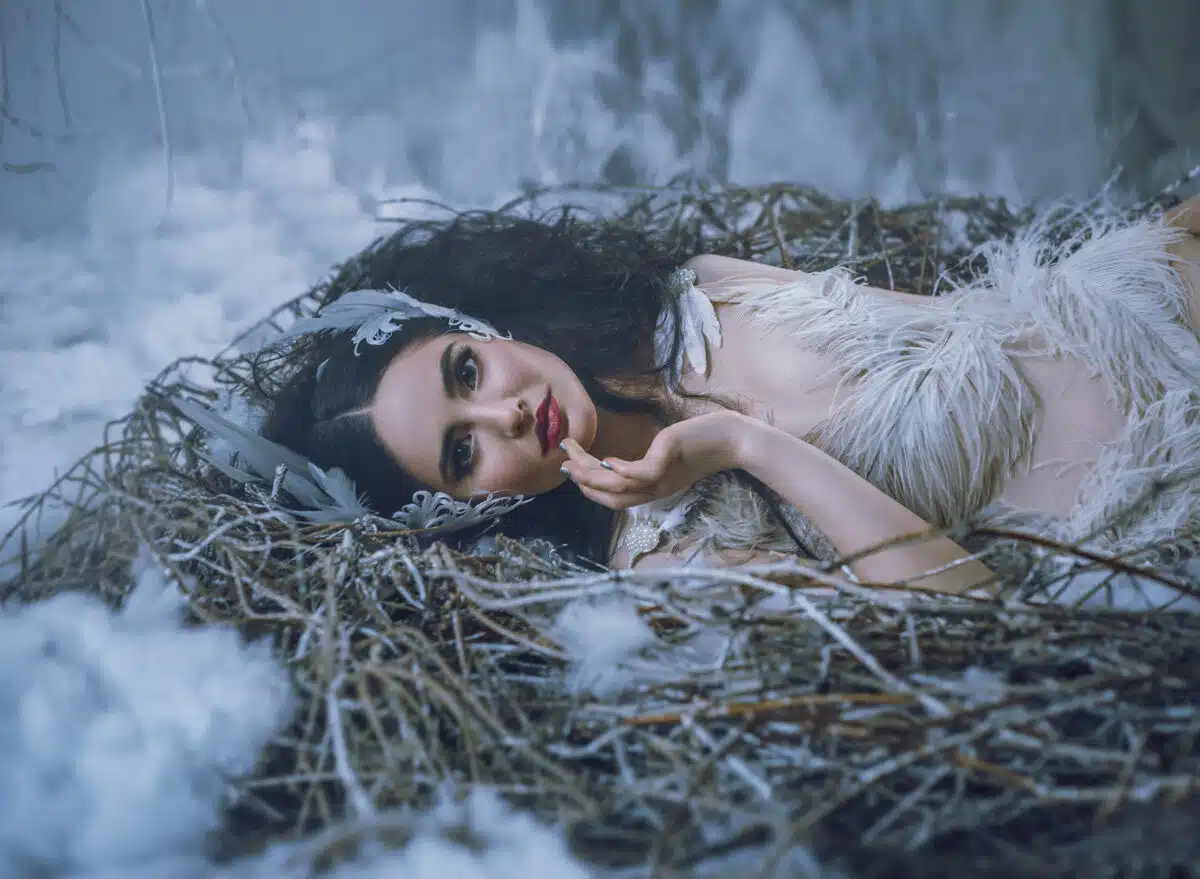
“Moonlight” by Ethelwyn Wetherald
When I see the ghost of night
Stealing through my window-pane,
Silken sleep and silver light
Struggle for my soul in vain;
Silken sleep all balmily
Breathes upon my lids oppressed,
Till I sudden start and see
Ghostly fingers on my breast.
White and skyey visitant,
Bringing beauty such as stings
All my inner soul to pant
After undiscovered things,
Spare me this consummate pain!
Silken weavings intercreep
Round my senses once again,
I am mortal—let me sleep.
“St. Peter’s by Moonlight” by Aubrey Thomas de Vere
Low hung the moon when first I stood in Rome;
Midway she seemed attracted from her sphere,
On those twin fountains shining broad and clear
Whose floods, not mindless of their mountain home,
Rise there in clouds of rainbow mist and foam.
That hour fulfilled the dream of many a year:
Through that thin mist, with joy akin to fear,
The steps I saw, the pillars, last, the dome.
A spiritual empire there embodied stood;
The Roman Church there met me face to face:
Ages, sealed up, of evil and of good
Slept in that circling colonnade’s embrace.
Alone I stood, a stranger and alone,
Changed by that stony miracle to stone.
“Laughing in the Moonlight” by Helen Louise Birch
Three women laughing
In the moonlight,
In the night—
Eerie,
Strange,
With sound of water
Thundering up the cliff;
With sound that comes from swaying boughs
Of pine trees,
Giant pines of a virgin forest—
Fringe of wilderness,
The border
Of a narrow strip of clearing
On the bluffs.
Laughing! How their voices carry!
Fearlessly!
Such merriment
As must awake the sleepy soul of the forest.
Merriment so mad—
How it carries!
Elfish laughter—
Far out over the wicked waters,
Peals and peals!
And the moonlight wavers, glitters,
Strokes their white throats with its poison;
Makes its streaks and streams of silver
Cold and colder in its joy;
Sinks its sharp, silver-dappled, shining moon-fangs
In their eyes.
Laughing women,
Mad and merry,
Send their voices on the winds;
Calling destiny about them,
Calling to titanic powers:
Till their play,
And their lightness,
And their madness,
And their harsh and eerie laughter
Rouses forces that through aeons
Long have slept—
Slept and waited for a summons
Deep enough,
Wild enough,
Light enough,
And evil enough,
To call them forth.
Slow they stretch their unused muscles—
Answer in a dawning smile.
Three women are laughing in the moonlight,
In the night;
And earth is reeling
In light and shadow.
Air and water,
In some fearful manner,
Mingle
With their voices.
All of nature throngs and rushes
Into the vast,
Chaotic
Drift of sound—
A world of maddened, unchained souls,
Of wicked, savage glee!
Naked Earth
Swings into consciousness,
Uncovered,
Sudden,
Reeling in light and shadow,
Through this hellish, hellish laughter!—
Through this wild,
Malicious,
Evil,
Evil
Laughter!
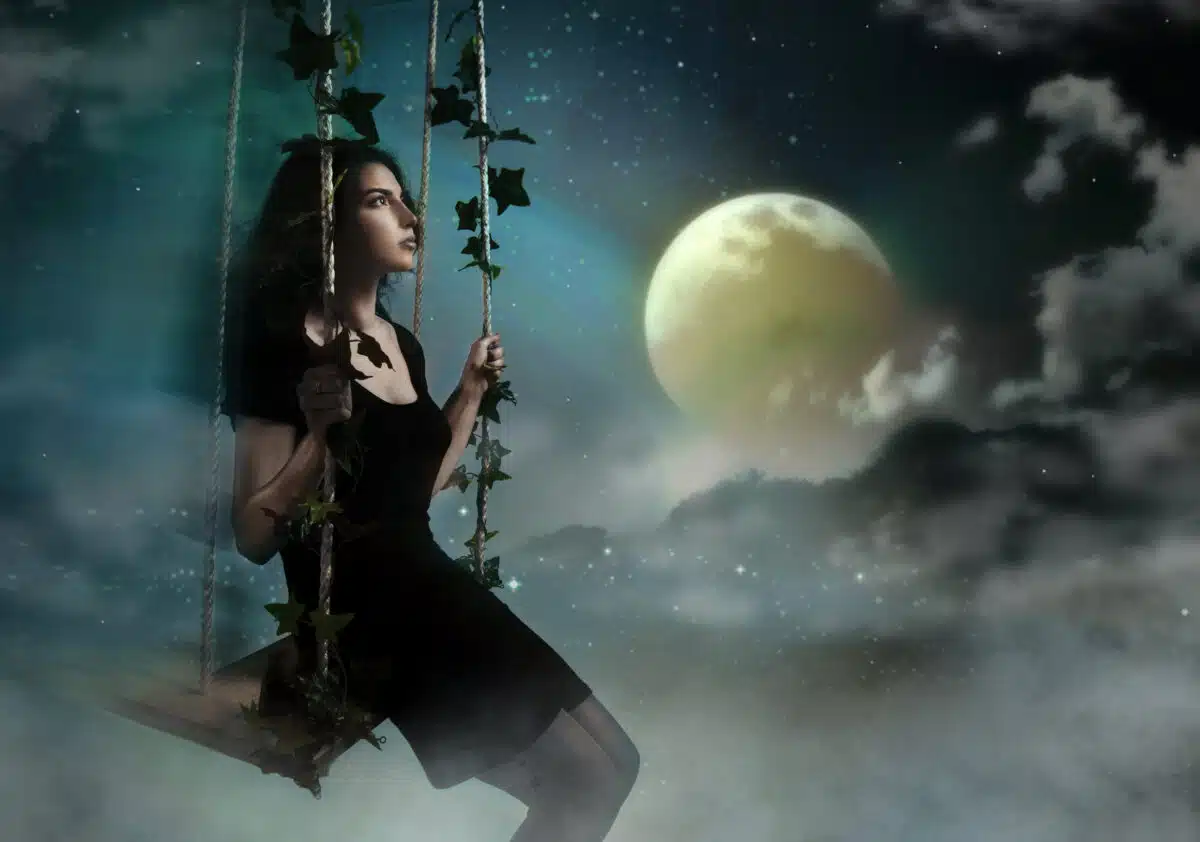
“A Thrush in the Moonlight” by Jessie B. Rittenhouse
In came the moon and covered me with wonder,
Touched me and was near me and made me very still.
In came a rush of song, like rain after thunder,
Pouring importunate on my window-sill.
I lowered my head, I hid it, I would not see nor hear,
The birdsong had stricken me, had brought the moon too near.
But when I dared to lift my head, night began to fill
With singing in the darkness. And then the thrush grew still.
And the moon came in, and silence, on my window-sill.
Poems About Moonlight and Love
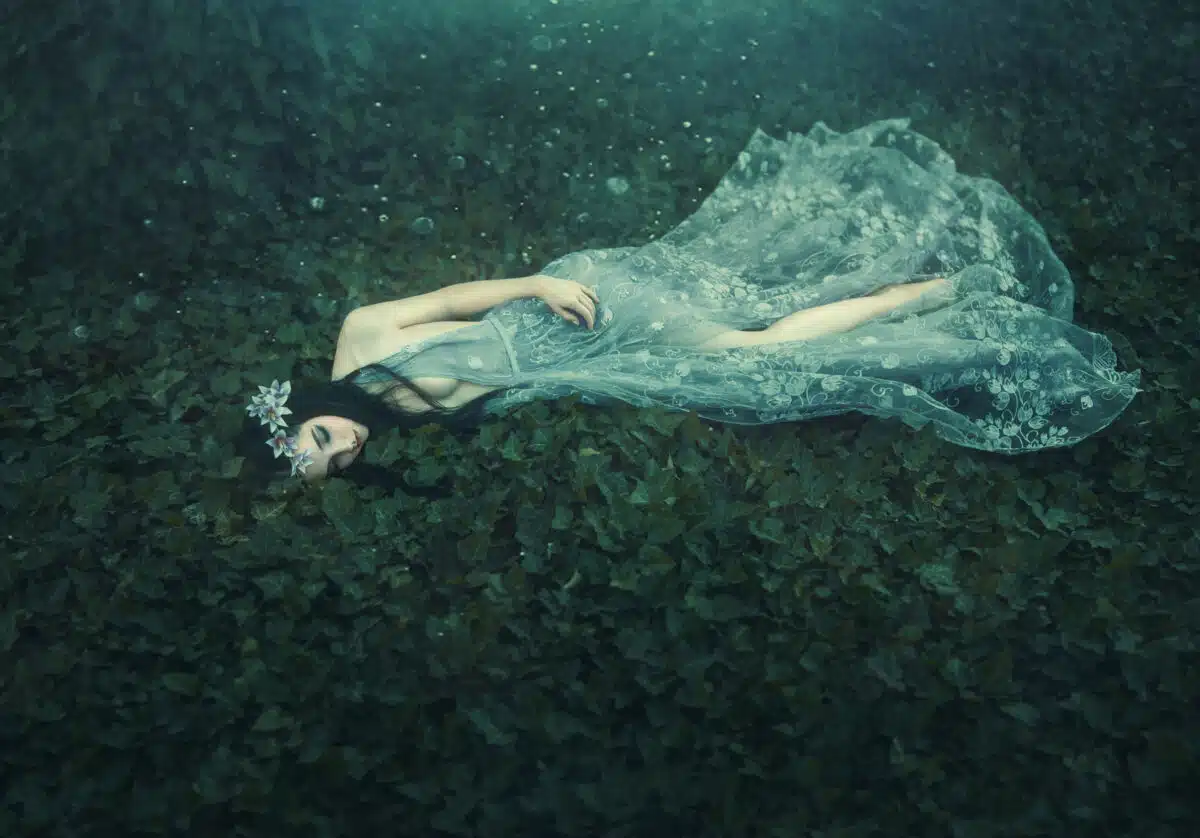
“The Dream” by Edna St. Vincent Millay
Love, if I weep it will not matter,
And if you laugh I shall not care;
Foolish am I to think about it,
But it is good to feel you there.
Love, in my sleep I dreamed of waking, —
White and awful the moonlight reached
Over the floor, and somewhere, somewhere,
There was a shutter loose, —it screeched!
Swung in the wind, — and no wind blowing! —
I was afraid, and turned to you,
Put out my hand to you for comfort, —
And you were gone! Cold, cold as dew,
Under my hand the moonlight lay!
Love, if you laugh I shall not care,
But if I weep it will not matter, —
Ah, it is good to feel you there!
“Moonrock” by Paul Cameron Brown
She wears a cat encrusted T-shirt
& panties with LOV*E
guarding the Paradise door
& when balm of night
casts shadows,
her face is moonrock
distant to mysterious
down storybook crags;
her darling form cloaked
in twilight garments
of an inky earth.
Gates of Venus,
. . . as if feline whiskers
whispered, wan cat eyes
in amber dark glowed pale honey
in alchemy or blur of soft movement
was caress to stars’ elopement
with the sky.
This woman summons fire,
stokes furnaces to quicken parchment leaves
of flame-thick desire,
honed soft on ripples
skin tones were curvaceous
drift of oars, vivacious breast on buttock’s
door, more moisture bead
holding regal court,
this prance down wet & downy stair.
Rain is a swift messenger
paw prints
with descent of night
where moon
becomes a plaything of
clouds’ passion,
and pincushion
upward surge of
clammy earth.
“The Letter” by Amy Lowell
Little cramped words scrawling all over the paper
Like draggled fly’s legs,
What can you tell of the flaring moon
Through the oak leaves?
Or of my uncertain window and the bare floor
Spattered with moonlight?
Your silly quirks and twists have nothing in them
Of blossoming hawthorns,
And this paper is dull, crisp, smooth, virgin of loveliness
Beneath my hand.
I am tired, Beloved, of chafing my heart against
The want of you;
Of squeezing it into little inkdrops,
And posting it.
And I scald alone, here, under the fire
Of the great moon.
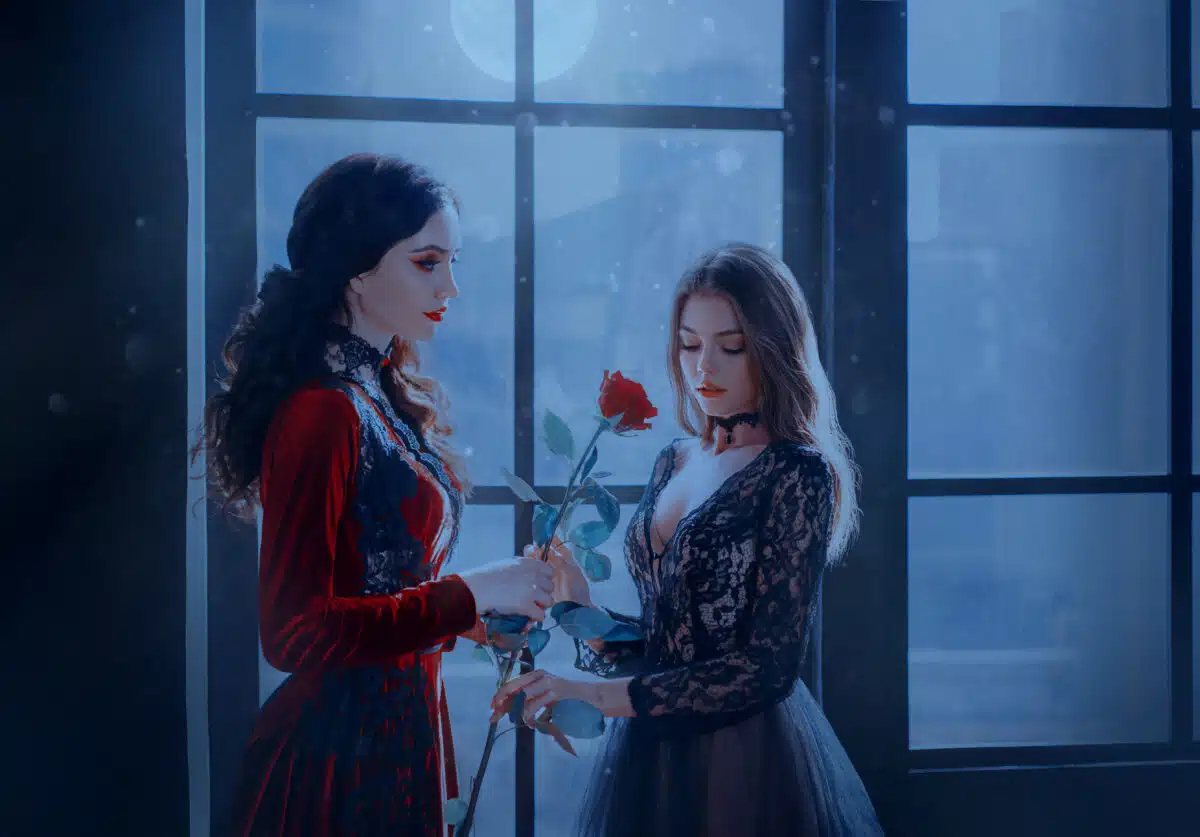
“Mother” by Lola Ridge
Your love was like moonlight
turning harsh things to beauty,
so that little wry souls
reflecting each other obliquely
as in cracked mirrors . . .
beheld in your luminous spirit
their own reflection,
transfigured as in a shining stream,
and loved you for what they are not.
You are less an image in my mind
than a luster
I see you in gleams
pale as star-light on a gray wall . . .
evanescent as the reflection of a white swan
shimmering in broken water.
“Chance” by Elsa Gidlow
Strange that a single white iris
Given carelessly one slumbering spring midnight
Should be the first of love,
Yet life is written so.
If it had been a rose
I might have smiled and pinned it to my dress:
We should have said Good Night indifferently
And never met again.
But the white iris!
It looked so infinitely pure
In the thin green moonlight.
A thousand little purple things
That had trembled about me through
the young years
Floated into a shape I seem always to have known
That I suddenly called Love!
The faint touch of your long fingers on mine
wakened me.
I saw that your tumbled hair was bright
with flame,
That your eyes were sapphire souls with
hungry stars in them,
And your lips were too near not to be kissed.
Life crouches at the knees of Chance
And takes what falls to her.
“Serenade” by Djuna Barnes
Three paces down the shore, low sounds the lute,
The better that my longing you may know;
I’m not asking you to come,
But—can’t you go?
Three words, “I love you,” and the whole is said—
The greatness of it throbs from sun to sun;
I’m not asking you to walk,
But—can’t you run?
Three paces in the moonlight’s glow I stand,
And here within the twilight beats my heart.
I’m not asking you to finish,
But—to start.
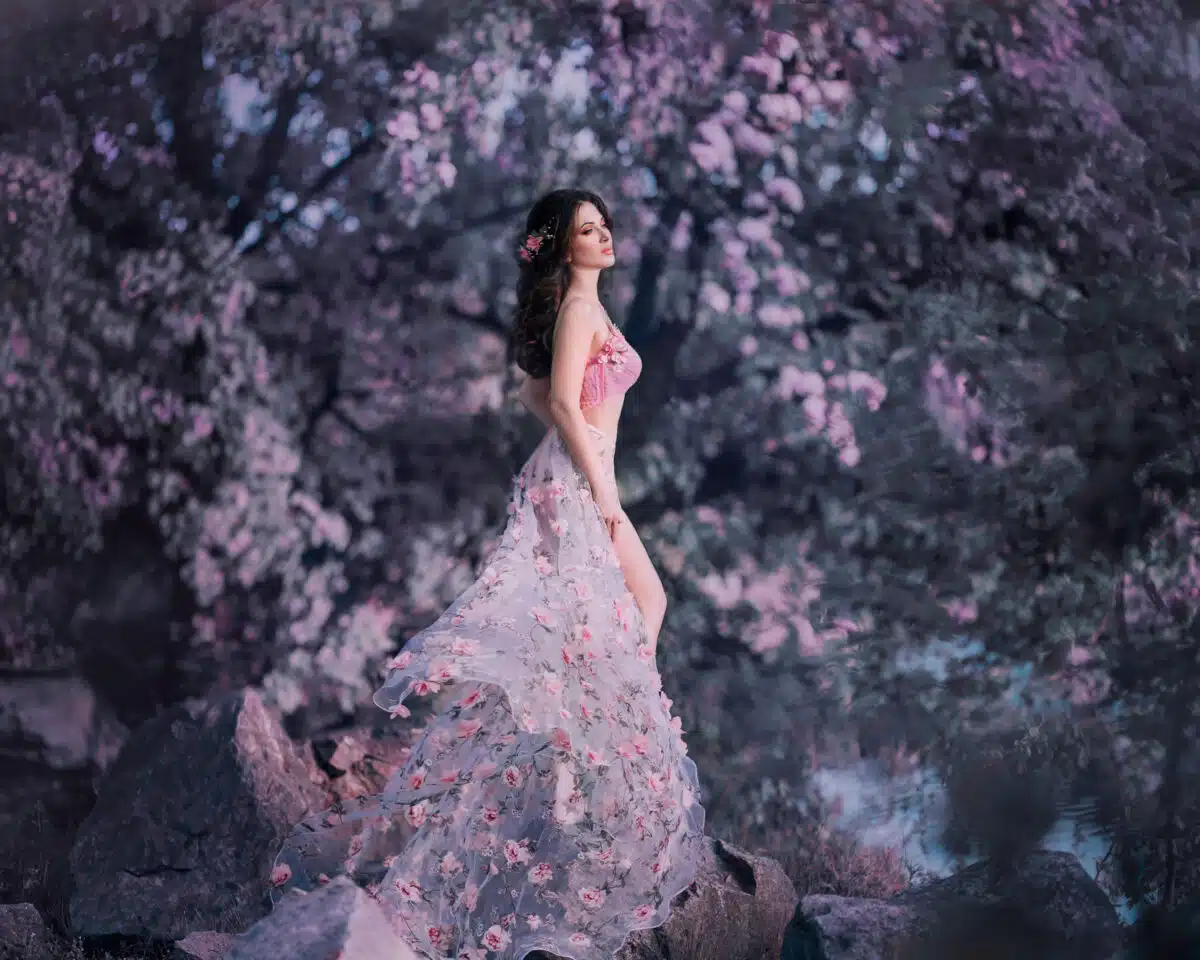
“Stolen Salvias” by Ameen Rihani
O, bleeding blossoms, tell, were my heart there—
There in your bed,
Would that sweet thief that stole you unaware
Have stolen it instead?
Come with me, scarlet salvias, to your home ;
We are not late ;
Love in the moonlight there again will roam—
There let us wait.
I still remember when one night she crowned
Me with the stars
Plucked from your scarlet sky—she would
astound
The kings of Mars.
She then would slay me—wash the face of night
With my bold blood—
Ay, she would show that yours is not as bright
And not as good.
O, scarlet salvias, why should I refuse
When I’m with you?
Why should I chill my lady, if she choose
To steal me too?
“Douce Souvenance” by Jessie Redmon Fauset
Again, as always, when the shadows fall,
In that sweet space between the dark and day,
I leave the present and its fretful claims
And seek the dim past where my memories stay.
I dream an old, forgotten, far-off dream,
And think old thoughts and live old scenes anew,
Till suddenly I reach the heart of Spring—
The spring that brought me you!
I see again a little woody lane,
The moonlight rifting golden through the trees;
I hear the plaintive chirp of drowsy bird
Lulled dreamward by a tender, vagrant breeze;
I hold your hand, I look into your eyes,
I touch your lips,—oh, peerless, matchless dower!
Oh, Memory thwarting Time and Space and Death!
Oh, Little Perfect Hour!
“Winter to Spring” by Irvin W. Underhill
Did not I remember that my hair is grey
With only a fringe of it left,
I’d follow your footsteps from wee break of day
Till night was of moon-light bereft.
Your eyes wondrous fountains of joy and of youth
Remind me of days long since flown,
My sweetheart, I led to the altar of truth,
But then the gay spring was my own.
Now winter has come with its snow and its wind
And made me as bare as its trees,
Oh, yes, I still love, but it’s only in mind,
For I’m fast growing weak at the knees.
Your voice is as sweet as the song of a bird,
Your manners are those of the fawn,
I dream of you, darling,—oh, pardon, that word,
From twilight to breaking of dawn.
Your name in this missive you’ll search for in vain,
Nor mine at the finis, I’ll fling,
For winter must suffer the bliss and the pain
In secret for loving the spring.
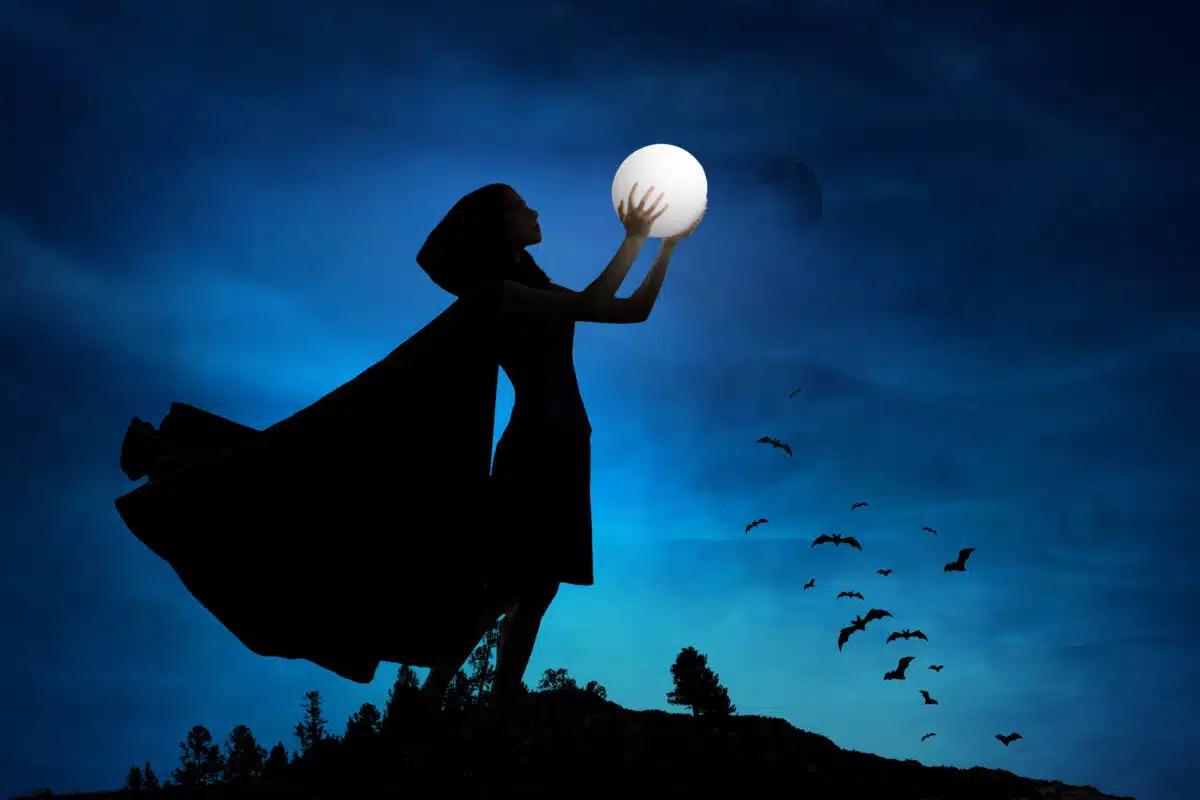
“When the Gloom is on the Glen” by William Makepeace Thackeray
When the moonlight’s on the mountain
And the gloom is on the glen,
At the cross beside the fountain
There is one will meet thee then.
At the cross beside the fountain;
Yes, the cross beside the fountain,
There is one will meet thee then!
I have braved, since first we met, love,
Many a danger in my course;
But I never can forget, love,
That dear fountain, that old cross,
Where, her mantle shrouded o’er her—
For the winds were chilly then—
First I met my Leonora,
When the gloom was on the glen.
Many a clime I’ve ranged since then, love,
Many a land I’ve wandered o’er;
But a valley like that glen, love,
Half so dear I never sor!
Ne’er saw maiden fairer, coyer,
Than wert thou, my true love, when
In the gloaming first I saw yer,
In the gloaming of the glen!
“Villanelle” by Otto Leland Bohanan
How dreary the winds shriek and whine:
The trembling shadows grow chill.
O soul of my soul, wert thou mine!
O where are the stars that did shine?
The moonlight that tinselled the hill?
How dreary the winds shriek and whine!
Despair ’round my heart doth entwine,
Far soundeth my cry weird and shrill:
O soul of my soul, wert thou mine!
I’ve quaffed to the dregs the mad wine
Of passion, but under my sill
How dreary the winds shriek and whine!
’Tis thine, is the dream so divine,
That doth this vain yearning instill;
O soul of my soul, wert thou mine!
’Tis mine, here to crave and to pine
For what thou wilt never fulfill;
How dreary the winds shriek and whine!
O soul of my soul, wert thou mine!
“And Yet—” by Frances Reed Gibson
A September Memory
Оh, do you not remember
In that golden-hued September
Long ago,
How we sat beneath the shadow
Of the gnarled oak in the meadow,
With the young moon rising o’er us,
And the river close before us
Murmuring a tender chorus
Minor-keyed and low?
In the soft September moonlight,
Shining clear as winter noonlight,
Vale and stream
And the far-off hills eternal
Glowed with that light supernal
Seen only in Love’s dream.
The subtle south-wind’s moaning
And the waves’ low undertoning
To us brought
Of the future no sad presage—
Only with Love’s heavenly message
Breeze and stream seemed fraught.
Still the restless river rushes,
With its fitful sobs and hushes,
Through the reeds along the shore ;
And the young moon, fair and tender,
Showers forth the same soft splendor.
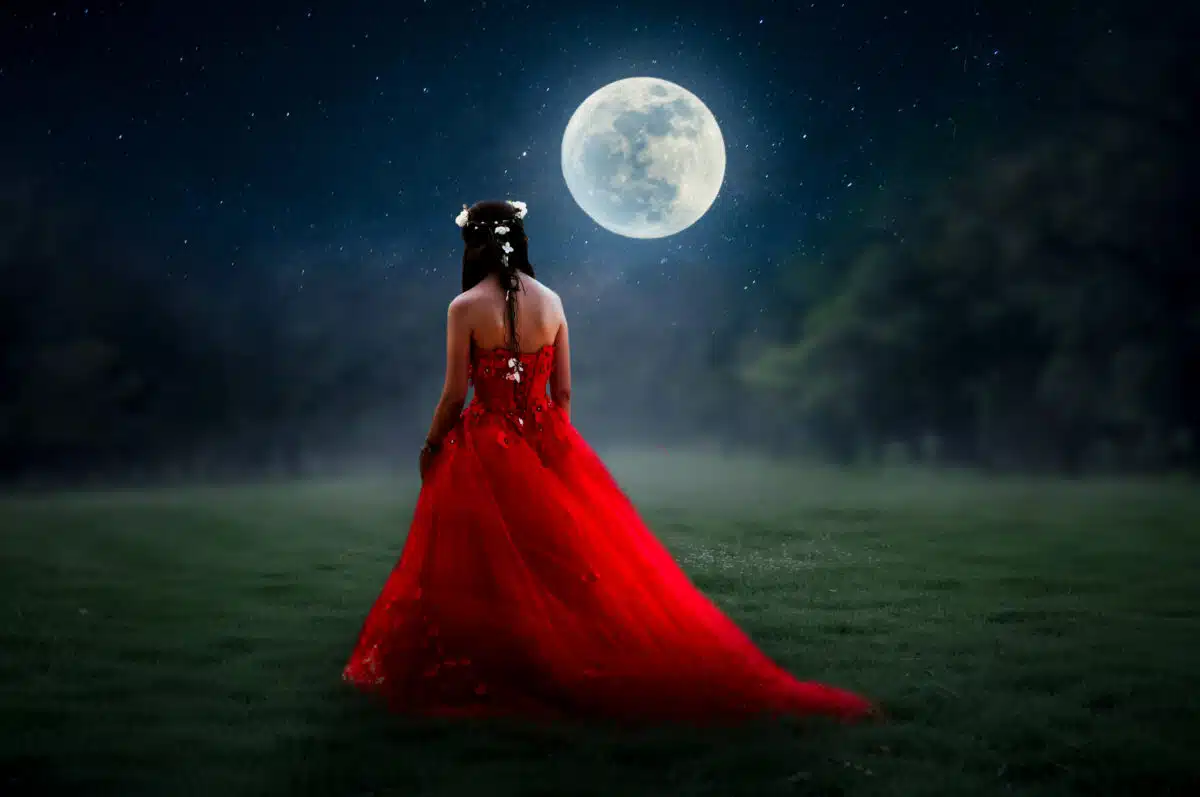
“The Moon Spirit” by Madison Julius Cawein
One night I lingered in the wood
And saw a spirit-form that stood
Among the wildflowers. Like the dew
It twinkled; partly wind and scent;
Then down a moonbeam there it blew,
And like a gleam of water went.
Or was it but a dream that grew
Out of the wind and dew and scent.
Could I have seized it, made it mine,
As poets have the thought divine
Of Nature, then I too might know,
(Like them who once wild magic bound
Into their rhymes of long-ago),
Such ecstasy of earth around
As never yet held heart before
Or language for its beauty found.
“The Vampire” by Madison Julius Cawein
A lily in a twilight place?
A moonflow’r in the lonely night?—
Strange beauty of a woman’s face
Of wildflow’r-white!
The rain that hangs a star’s green ray
Slim on a leaf-point’s restlessness,
Is not so glimmering green and gray
As was her dress.
I drew her dark hair from her eyes,
And in their deeps beheld a while
Such shadowy moonlight as the skies
Of Hell may smile.
She held her mouth up redly wan,
And burning cold,—I bent and kissed
Such rosy snow as some wild dawn
Makes of a mist.
God shall not take from me that hour,
When round my neck her white arms clung!
When ‘neath my lips, like some fierce flower,
Her white throat swung!
Or words she murmured while she leaned!
Witch-words, she holds me softly by,—
The spell that binds me to a fiend
Until I die.
“Lucinda Matlock” by Edgar Lee Masters
I went to the dances at Chandlerville,
And played snap-out at Winchester.
One time we changed partners,
Driving home in the moonlight of middle June,
And then I found Davis.
We were married and lived together for seventy years,
Enjoying, working, raising the twelve children,
Eight of whom we lost
Ere I had reached the age of sixty.
I spun, I wove, I kept the house, I nursed the sick,
I made the garden, and for holiday
Rambled over the fields where sang the larks,
And by Spoon River gathering many a shell,
And many a flower and medicinal weed–
Shouting to the wooded hills, singing to the green valleys.
At ninety-six I had lived enough, that is all,
And passed to a sweet repose.
What is this I hear of sorrow and weariness,
Anger, discontent and drooping hopes?
Degenerate sons and daughters,
Life is too strong for you–
It takes life to love Life.
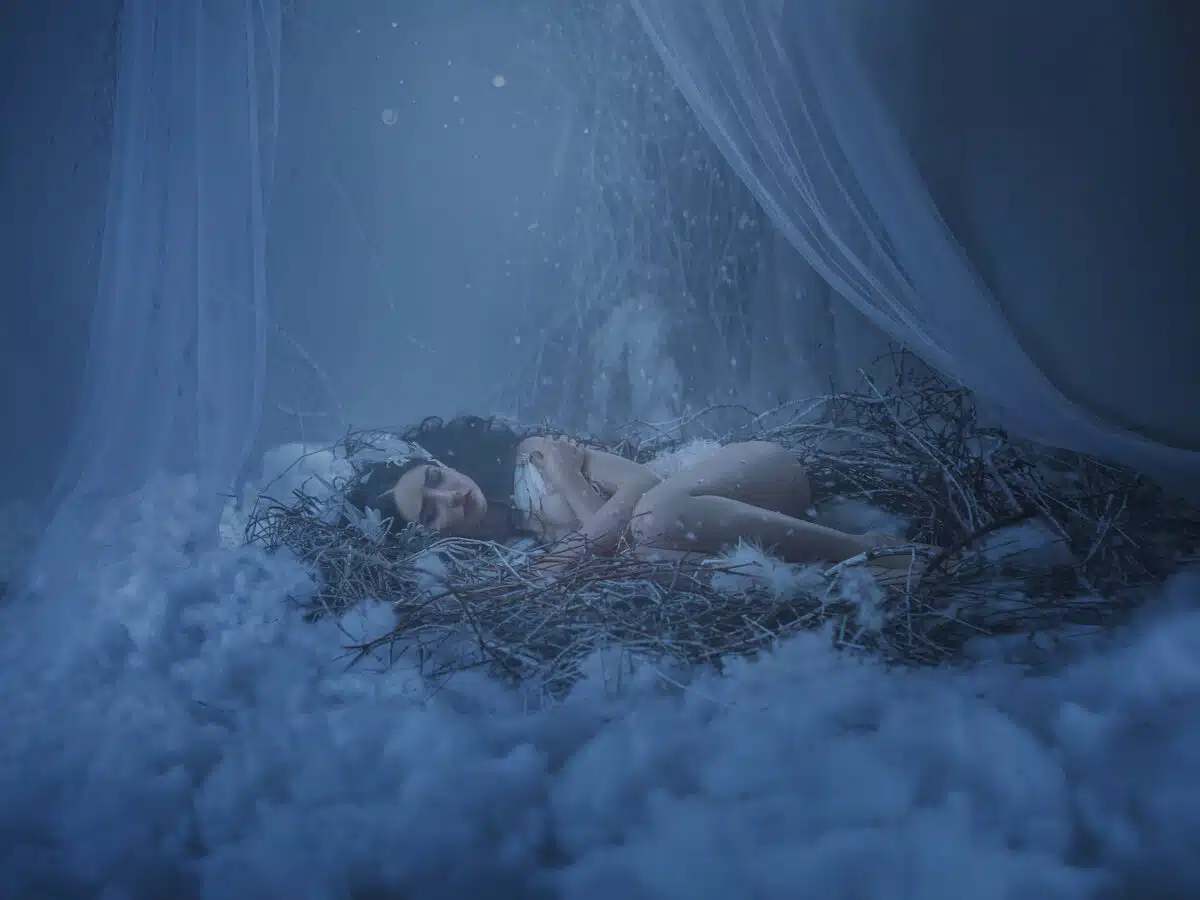
“Good-Night” by Richard Le Gallienne
Midnight, and through the blind the moonlight stealing
On silver feet across the sleeping room,
Ah, moonlight, what is this thou art revealing –
Her breast, a great sweet lily in the gloom.
It is their bed, white little isle of bliss
In the dark wilderness of midnight sea, –
Hush! ’tis their hearts still beating from the kiss,
The warm dark kiss that only night may see.
Their cheeks still burn, they close and nestle yet,
Ere, with faint breath, they falter out good-night,
Her hand in his upon the coverlet
Lies in the silver pathway of the light.
“On Tweed River” by Sir Walter Scott
I.
Merrily swim we, the moon shines bright,
Both current and ripple are dancing in light.
We have roused the night raven, I heard him croak
As we plashed along beneath the oak
That flings its broad branches so far and so wide,
Their shadows are dancing in the midst of the tide.
“Who wakens my nestlings,” the raven he said,
“My beak shall ere morn in his blood be red,
For a blue-swollen corpse is a dainty meal,
And I’ll have my share with the pike and the eel.”
II.
Merrily swim we, the moon shines bright,
There’s a golden gleam on the distant height;
There’s a silver shadow on the alders dank,
And the drooping willows that wave on the bank.
I see the Abbey, both turret and tower,
It is all astir for the vesper hour;
The monks for the chapel are leaving each cell,
But where’s Father Philip, should toll the bell?
III.
Merrily swim we, the moon shines bright,
Downward we drift through shadow and light.
Under yon rock the eddies sleep,
Calm and silent, dark and deep.
The Kelpy has risen from the fathomless pool,
He hath lighted his candle of death and of dool:
Look, Father, look, and you’ll laugh to see
How he gapes and he glares with his eyes on thee!
IV.
Good luck to your fishing, whom watch ye to night?
A man of mean or a man of might?
Is it layman or priest that must float in your cove,
Or lover who crosses to visit his love?
Hark! heard ye the Kelpy reply as we passed,
“God’s blessing on the warder, he lock’d the bridge fast!
All that come to my cove are sunk,
Priest or layman, lover or monk.”
Landed! landed! the black book hath won,
Else had you seen Berwick with morning sun!
Sain ye, and save ye, and blithe mot ye be,
For seldom they land that go swimming with me.
“Moonlight North and South” by Robert Fuller Murray
Love, we have heard together
The North Sea sing his tune,
And felt the wind’s wild feather
Brush past our cheeks at noon,
And seen the cloudy weather
Made wondrous with the moon.
Where loveliness is rarest,
‘Tis also prized the most:
The moonlight shone her fairest
Along that level coast
Where sands and dunes the barest,
Of beauty seldom boast,
Far from that bleak and rude land
An exile I remain
Fixed in a fair and good land,
A valley and a plain
Rich in fat fields and woodland,
And watered well with rain.
Last night the full moon’s splendour
Shone down on Taunton Dene,
And pasture fresh and tender,
And coppice dusky green,
The heavenly light did render
In one enchanted scene,
One fair unearthly vision.
Yet soon mine eyes were cloyed,
And found those fields Elysian
Too rich to be enjoyed.
Or was it our division
Made all my pleasure void?
Across the window glasses
The curtain then I drew,
And, as a sea-bird passes,
In sleep my spirit flew
To grey and windswept grasses
And moonlit sands–and you.
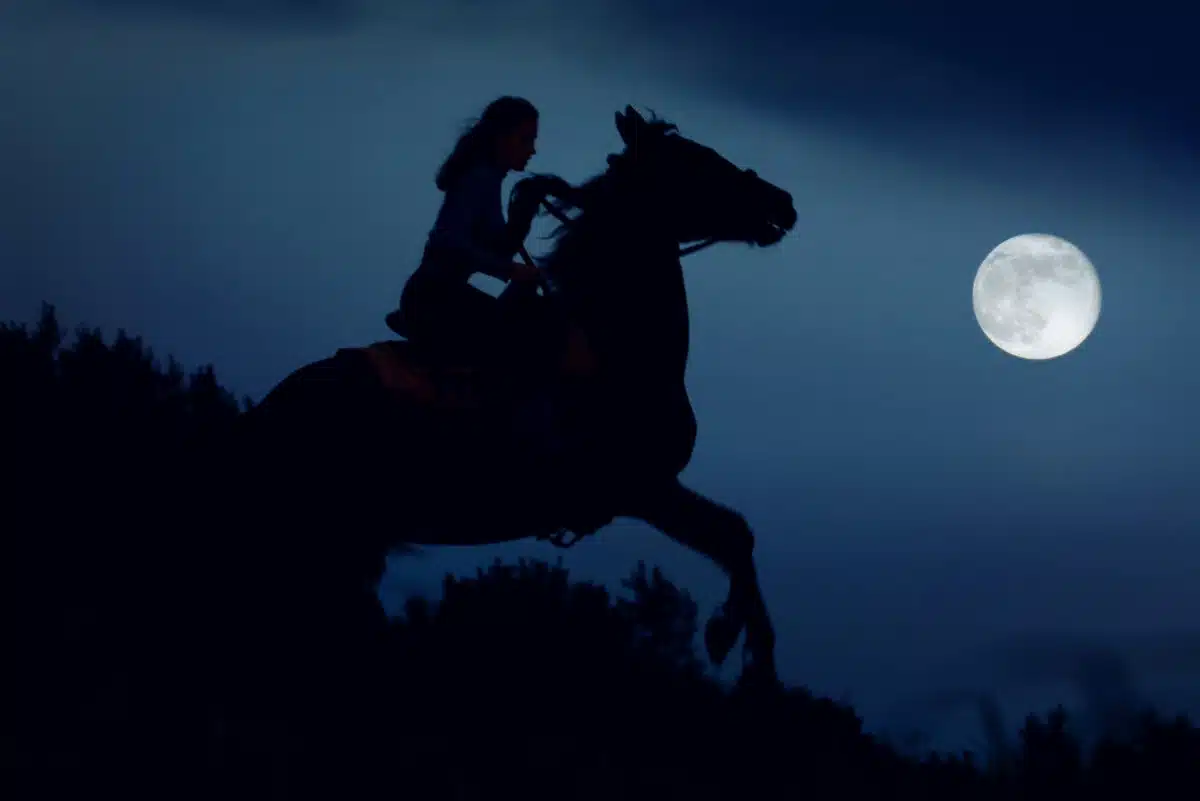
“The Russian Lover.” by Thomas Moore
Fleetly o’er the moonlight snows
Speed we to my lady’s bower;
Swift our sledge as lightning goes,
Nor shall stop till morning’s hour.
Bright, my steed, the northern star
Lights us from yon jewelled skies;
But to greet us, brighter far,
Morn shall bring my lady’s eyes.
Lovers, lulled in sunny bowers,
Sleeping out their dream of time,
Know not half the bliss that’s ours,
In this snowy, icy clime.
Like yon star that livelier gleams
From the frosty heavens around,
Love himself the keener beams
When with snows of coyness crowned.
Fleet then on, my merry steed,
Bound, my sledge, o’er hill and dale;–
What can match a lover’s speed?
See, ’tis daylight, breaking pale!
Brightly hath the northern star
Lit us from yon radiant Skies;
But, behold, how brighter far
Yonder shine my lady’s eyes!
“Pardon Time” by John Charles McNeill
Give over now; forbear. The moonlight steeps
In silver silence towered castle-keeps
And cottage crofts, where apples bend the bough.
Peace guards us round, and many a tired heart sleeps.
Let me brush back the shadow from your brow.
Give over now.
On such a night, how sweet, how sweet is life,
Even to the insect piper with his fife!
And must your troubled face still bear the blight
Of strength that runs itself to waste in strife?
For love’s own heart should throb through all the light
Of such a night.
“The Songs of Bilitis IV: Dances by Moonlight” by Pierre Louÿs
Upon the soft grass, in the night, the young girls with hair of violets have all danced together, one of each pair playing the part of lover.
The virgins said: “We are not for you.” And as if they were ashamed, they hid their virginity. A satyr played upon the flute under the trees.
The others said: “We have come to seek you.” They arranged their tunics about them like the dress of men; and they struggled in ecstasy while entwining their dancing legs.
Then each one feeling herself vanquished, took her lover by the ears even as one takes a beaker by the two handles, and, the head bent forward, drank a kiss.
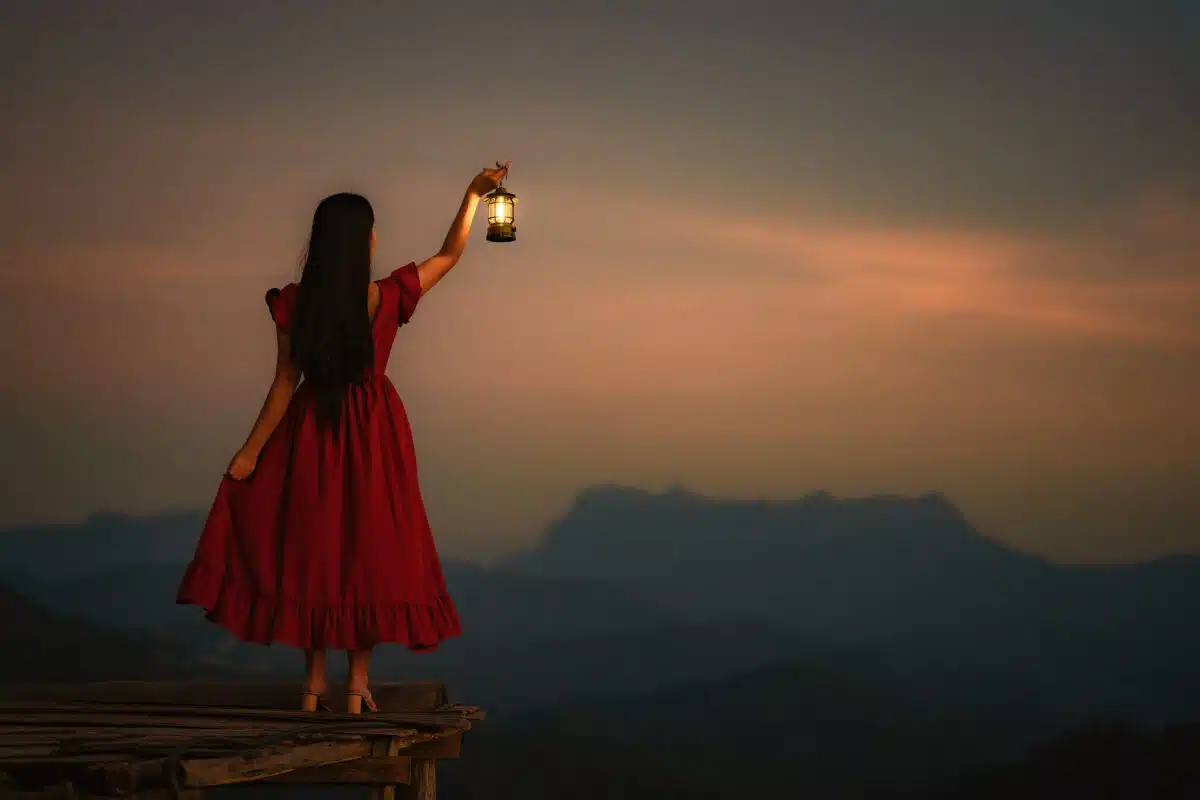
“Moonlight in June” by James Dixon
Thou hast a gentle ministry, O Moon!
Riding in solemn silence through the sky,
And gazing from thy trackless path on high
Upon the beauty of the leafy June:
On such a lovely night, I ween, as this,
ENDYMION felt thy pale lip’s dewy kiss;
For far around on every plain and hill,
In the soft gleaming of thy gleaming ray,
Flower, tree, and forest, breathless now and still,
Rest from the burning brightness of the day;
Silence is over all. Yon murmuring rill
Alone leaps gladly on its tireless way:
In thy soft rays how beautiful is Night!
Like man’s cloud-covered path, by woman’s love made bright!
“Moonlight Upon the Hills” by Mrs. Elizabeth F. Swift
Moonlight upon the hills! there is a spell
Like witchery o’er us: as we gaze around,
A tender light illumines hill and dell,
Falling in golden checkers on the ground.
Now perfume steals from out the forest shades;
All fragrant things and fair their incense bring;
And hark! amid the dim wood’s tangled glades,
I hear the gushing waters laugh and sing.
Among the clustering leaves of yonder oak
A ring-dove’s nest is hid,—list her soft moan:
Love never to Night’s ear in language spoke,
Calling with deeper fondness on its own.
World! if to thee, sin-stained, such lavish charms are given,
How can a human thought conceive the spirit joys of heaven!
Sad Poems About Moonlight
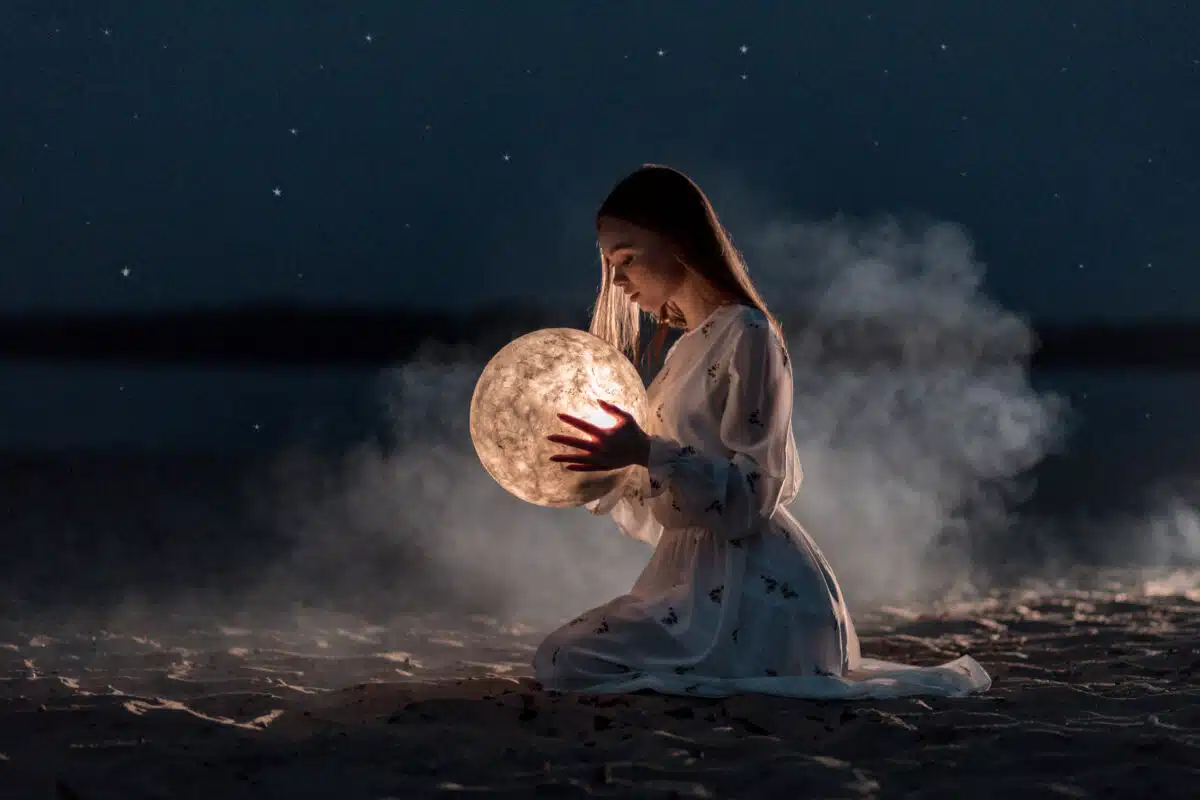
“April Moon” by Walter De La Mare
Roses are sweet to smell and see,
And lilies on the stem;
But rarer, stranger buds there be,
And she was like to them.
The little moon that April brings,
More lovely shade than light,
That, setting, silvers lonely hills
Upon the verge of night –
Close to the world of my poor heart
So stole she, still and clear;
Now that she’s gone, O dark, and dark,
The solitude, the fear.
“The Moonlight” by Yvor Winters
I waited on
In the late autumn moonlight,
A train droning out of thought—
The mind on moonlight
And on trains.
Blind as a thread of water
Stirring through a cold like dust,
Lonely beyond all silence
And humming this to children,
The nostalgic listeners in sleep,
Because no guardian
Strides through distance upon distance,
His eyes a web of sleep.
“Moonlight” by Sara Teasdale
It will not hurt me when I am old,
A running tide where moonlight burned
Will not sting me like silver snakes;
The years will make me sad and cold,
It is the happy heart that breaks.
The heart asks more than life can give,
When that is learned, then all is learned;
The waves break fold on jewelled fold,
But beauty itself is fugitive,
It will not hurt me when I am old.
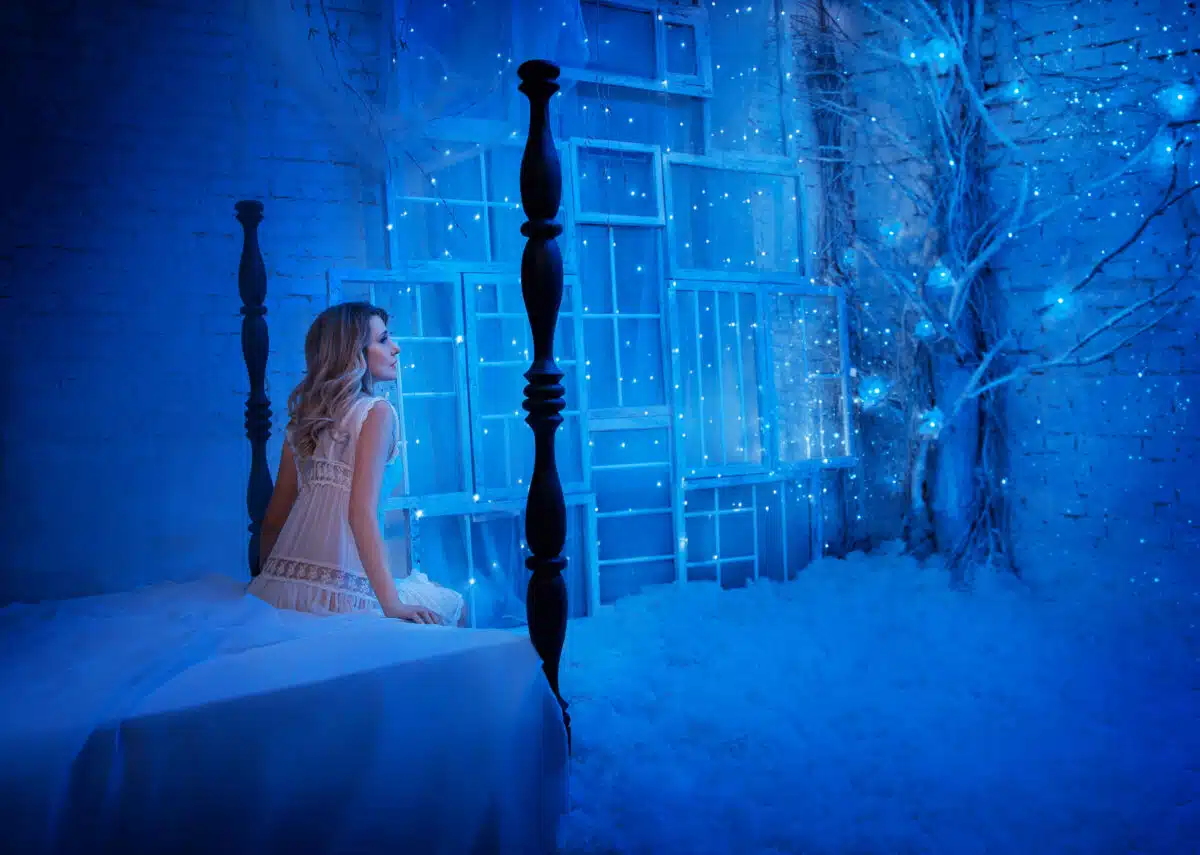
“A Chilly Night” by Christina Rossetti
I rose at the dead of night,
And went to the lattice alone
To look for my Mother’s ghost
Where the ghostly moonlight shone.
My friends had failed one by one,
Middle-aged, young, and old,
Till the ghosts were warmer to me
Than my friends that had grown cold.
I looked and I saw the ghosts
Dotting plain and mound:
They stood in the blank moonlight,
But no shadow lay on the ground:
They spoke without a voice
And they leaped without a sound.
I called: ‘O my Mother dear,’—
I sobbed: ‘O my Mother kind,
Make a lonely bed for me
And shelter it from the wind.
‘Tell the others not to come
To see me night or day:
But I need not tell my friends
To be sure to keep away.’
My Mother raised her eyes,
They were blank and could not see:
Yet they held me with their stare
While they seemed to look at me.
She opened her mouth and spoke;
I could not hear a word,
While my flesh crept on my bones
And every hair was stirred.
She knew that I could not hear
The message that she told
Whether I had long to wait
Or soon should sleep in the mould:
I saw her toss her shadowless hair
And wring her hands in the cold.
I strained to catch her words,
And she strained to make me hear;
But never a sound of words
Fell on my straining ear.
From midnight to the cockcrow
I kept my watch in pain
While the subtle ghosts grew subtler
In the sad night on the wane.
From midnight to the cockcrow
I watched till all were gone,
Some to sleep in the shifting sea
And some under turf and stone:
Living had failed and dead had failed,
And I was indeed alone.
“The Tear.” by Thomas Moore
On beds of snow the moonbeam slept,
And chilly was the midnight gloom,
When by the damp grave Ellen wept–
Fond maid! it was her Lindor’s tomb!
A warm tear gushed, the wintry air,
Congealed it as it flowed away:
All night it lay an ice-drop there,
At morn it glittered in the ray.
An angel, wandering from her sphere,
Who saw this bright, this frozen gem,
To dew-eyed Pity brought the tear
And hung it on her diadem!
“To the Moonbeam.” by Percy Bysshe Shelley
1.
Moonbeam, leave the shadowy vale,
To bathe this burning brow.
Moonbeam, why art thou so pale,
As thou walkest o’er the dewy dale,
Where humble wild-flowers grow?
Is it to mimic me?
But that can never be;
For thine orb is bright,
And the clouds are light,
That at intervals shadow the star-studded night.
2.
Now all is deathy still on earth;
Nature’s tired frame reposes;
And, ere the golden morning’s birth
Its radiant hues discloses,
Flies forth its balmy breath.
But mine is the midnight of Death,
And Nature’s morn
To my bosom forlorn
Brings but a gloomier night, implants a deadlier thorn.
3.
Wretch! Suppress the glare of madness
Struggling in thine haggard eye,
For the keenest throb of sadness,
Pale Despair’s most sickening sigh,
Is but to mimic me;
And this must ever be,
When the twilight of care,
And the night of despair,
Seem in my breast but joys to the pangs that rankle there.
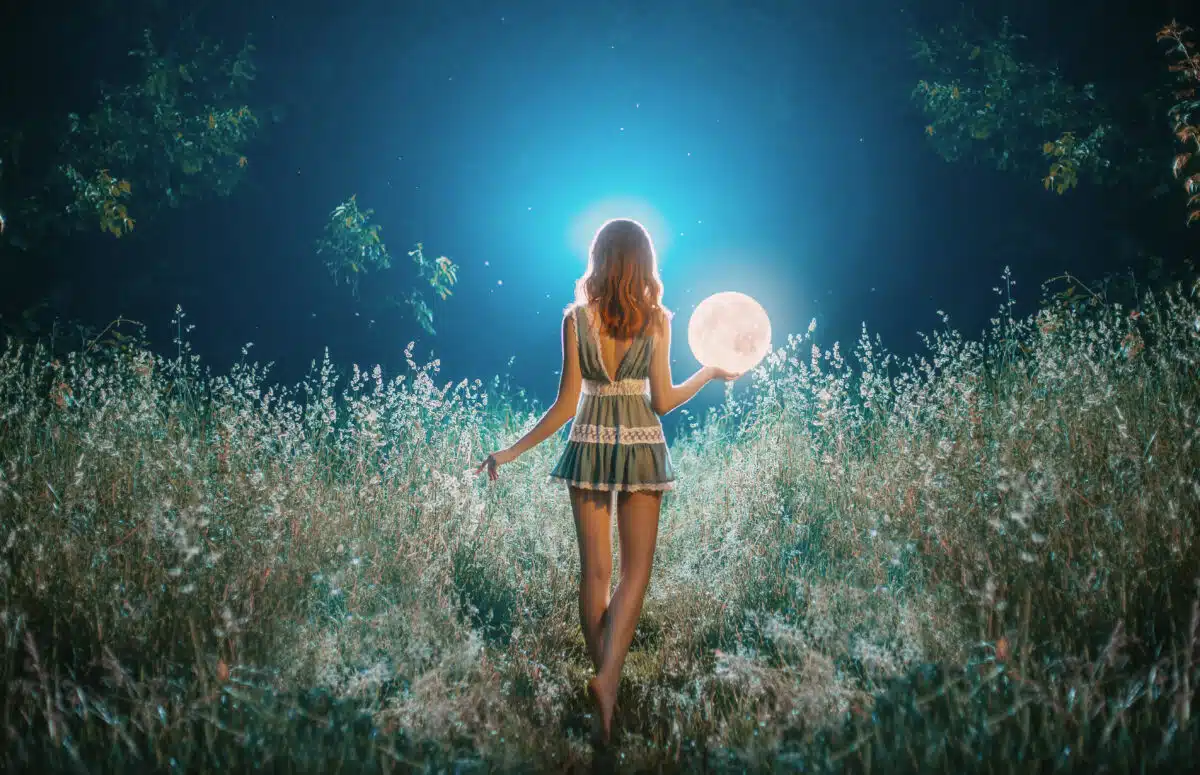
“Moonlight.” by Fannie Isabelle Sherrick
Oh, what so subtle as the spell
The silvery moonlight weaves?
Oh, what so sad and what so glad,
And what so soon deceives.
A vision of the long ago–
Long years of pain between;
A mocking dream of happier days–
A veil of silver sheen.
A passing gleam of falling stars–
An idle summer’s dream;
The sudden waking of a heart–
Things are not as they seem.
Oh, silver moon, indeed you hold
The secrets of the heart;
And none can know and none can guess
The mystery of thy art.
A silver length of rippling waves,
A glance from happy eyes;
A strain of music low and sweet–
The heart in rapture lies.
Yet, ah, how faithless are the vows
Made ‘neath the summer moon;
As changing as the falling rays
That fade away as soon.
For love is like the subtle spell
The sliver moonlight weaves;
And what so sad and what so glad
And what so soon deceives?
“Sea Dreams.” by Madison Julius Cawein
Oh, to see in the night in a May moon’s light
A nymph from siren caves,
With a crown of pearl, sea-gems in each curl
Dance down white, star-stained waves!
Oh, to list in the gloam by the pearly foam
Of a sad, far-sounding shore
The strain of the shell of an ocean belle
From caves where the waters roar!
With a hollow shell drift up in the moon
To sigh in my ears this ocean tune: –
“Wilt follow, wilt follow to caverns hollow,
That echo the tumbling spry?
Wilt follow thy queen to islands green,
Vague islands of witchery?
O follow, follow to grottoes hollow,
And isles in a purple sea,
Where rich roses twine and the lush woodbine
Weaves a musky canopy!”
Oh, to float in the gloam on the bubbly foam
With her lily face above!
Oh, to lie in a barque and a wild song hark,
And a billow-nymph to love!
I’d lie at her feet and my heart should beat
To the music of her sighs;
But the stars in her face my passion should trace,
Unseen all the stars of the skies.
Away, away with the witch of spray
To her Aidenn islands far;
And the blue above, drunk-mad with love,
Dance down each singing star.
Leave, leave to the heaven its morning star
In a cloud of bolted snow,
To laugh at the world and herald far
Our wedlock and joy below.
“Satires of Circumstance XV: In the Moonlight” by Thomas Hardy
“O lonely workman, standing there
In a dream, why do you stare and stare
At her grave, as no other grave there were?
“If your great gaunt eyes so importune
Her soul by the shine of this corpse-cold moon,
Maybe you’ll raise her phantom soon!”
“Why, fool, it is what I would rather see
Than all the living folk there be;
But alas, there is no such joy for me!”
“Ah she was one you loved, no doubt,
Through good and evil, through rain and drought,
And when she passed, all your sun went out?”
“Nay: she was the woman I did not love,
Whom all the others were ranked above,
Whom during her life I thought nothing of.”
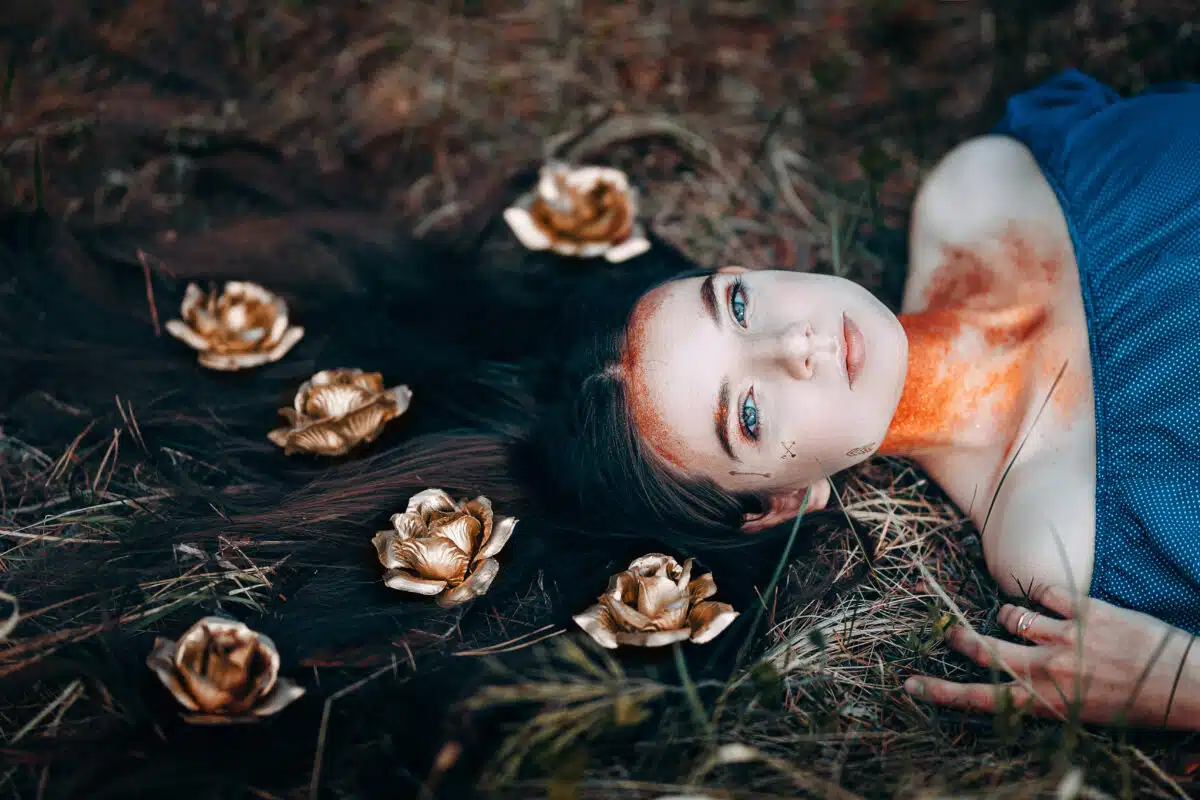
“The Murderess” by Alice Cary
Along the still cold plain o’erhead,
In pale embattled crowds.
The stars their tents of darkness spread,
And camped among the clouds;
Cinctured with shadows, like a wraith,
Night moaned along the lea;
Like the blue hungry eye of Death,
Shone the perfidious sea;
The moon was wearing to the wane,
The winds were wild and high,
And a red meteor’s flaming mane
Streamed from the northern sky.
Across the black and barren moor,
Her dainty bosom bare;
And white lips sobbing evermore,
Rides Eleanor the fair.
So hath the pining sea-maid plained
For love of mortal lips,
Riding the billows, silver-reined.
Hard by disastrous ships.
Why covers she her mournful eyes?
Why do her pulses cease,
As if she saw before her rise
The ghost of murdered Peace?
From out her path the ground-bird drifts
With wildly startled calls,
The moonlight snake its white fold lifts
From where her shadow falls.
Ah me! I that delicate hand of hers,
Now trembling like a reed.
Like to the ancient mariner’s
Hath done a hellish deed;
And full of mercy were the frown
Which might the power impart
To press the eternal darkness down
Against her bleeding heart.
“Moonlight” by Jacques Tahureau (Andrew Lang, Translator)
The high Midnight was garlanding her head,
With many a shining star in shining skies,
And, of her grace, a slumber on mine eyes,
And, after sorrow, quietness was shed.
Far in dim fields cicalas jargonéd
A thin shrill clamour of complaints and cries;
And all the woods were pallid, in strange wise,
With pallor of the sad moon overspread.
Then came my lady to that lonely place,
And, from her palfrey stooping, did embrace
And hang upon my neck, and kissed me over;
Wherefore the day is far less dear than night,
And sweeter is the shadow than the light,
Since night has made me such a happy lover.
Deep Poems About Moonlight
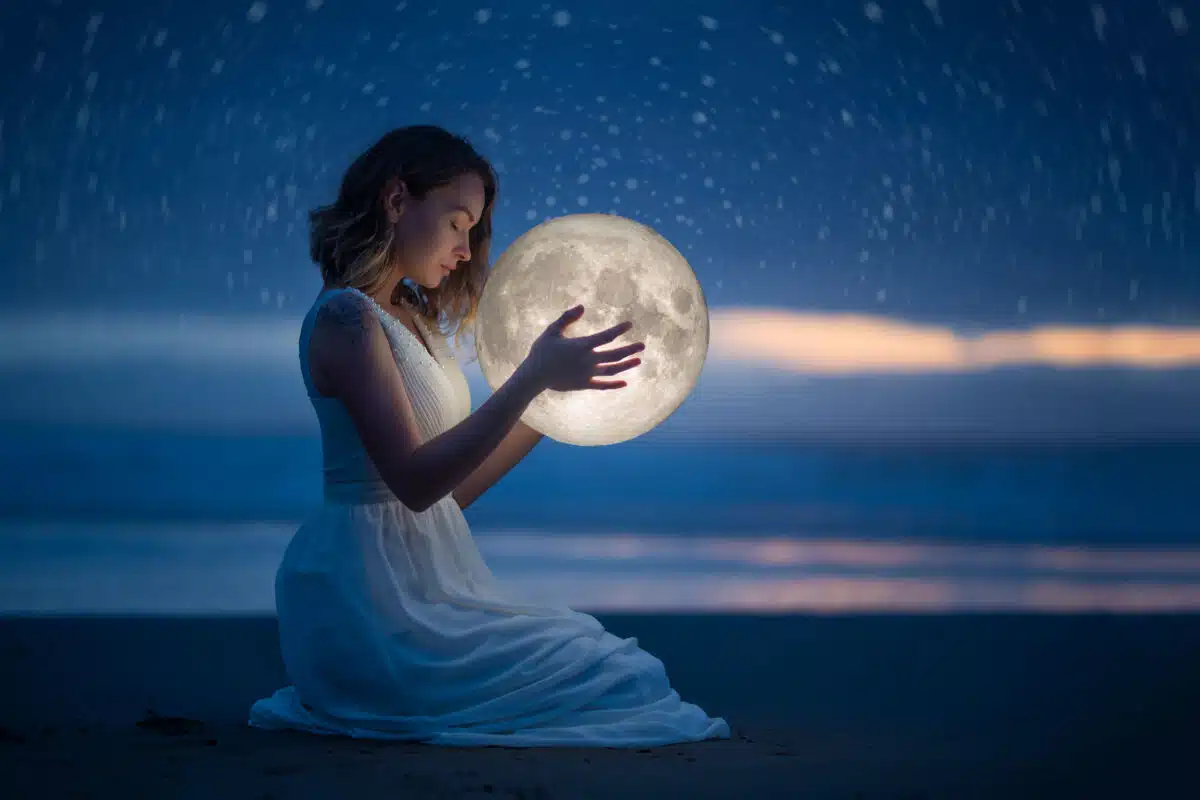
“Full Moon” by Victoria Mary Sackville-West
She was wearing the coral taffeta trousers
Someone had brought her from Ispahan,
And the little gold coat with pomegranate blossoms,
And the coral-hafted feather fan;
But she ran down a Kentish lane in the moonlight,
And skipped in the pool of the moon as she ran.
She cared not a rap for all the big planets,
For Betelgeuse or Aldebaran,
And all the big planets cared nothing for her,
That small impertinent charlatan;
But she climbed on a Kentish stile in the moonlight,
And laughed at the sky through the sticks of her fan.
“The Moon.” by George MacDonald
She comes! again she comes, the bright-eyed moon!
Under a ragged cloud I found her out,
Clasping her own dark orb like hope in doubt!
That ragged cloud hath waited her since noon,
And he hath found and he will hide her soon!
Come, all ye little winds that sit without,
And blow the shining leaves her edge about,
And hold her fast–ye have a pleasant tune!
She will forget us in her walks at night
Among the other worlds that are so fair!
She will forget to look on our despair!
She will forget to be so young and bright!
Nay, gentle moon, thou hast the keys of light–
I saw them hanging by thy girdle there!
“The Wind and the Moon” by George MacDonald
Said the Wind to the Moon, “I will blow you out!
You stare
In the air
As if crying Beware,
Always looking what I am about:
I hate to be watched; I will blow you out!”
The Wind blew hard, and out went the Moon.
So, deep
On a heap
Of clouds, to sleep
Down lay the Wind, and slumbered soon,
Muttering low, “I’ve done for that Moon!”
He turned in his bed: she was there again!
On high
In the sky
With her one ghost-eye
The Moon shone white and alive and plain:
Said the Wind, “I will blow you out again!”
The Wind blew hard, and the Moon grew slim.
“With my sledge
And my wedge
I have knocked off her edge!
I will blow,” said the Wind, “right fierce and grim,
And the creature will soon be slimmer than slim!”
He blew and he blew, and she thinned to a thread.
“One puff
More’s enough
To blow her to snuff!
One good puff more where the last was bred,
And glimmer, glimmer, glum will go that thread!”
He blew a great blast, and the thread was gone.
In the air
Nowhere
Was a moonbeam bare;
Larger and nearer the shy stars shone:
Sure and certain the Moon was gone!
The Wind he took to his revels once more;
On down
And in town,
A merry-mad clown,
He leaped and holloed with whistle and roar–
When there was that glimmering thread once more!
He flew in a rage–he danced and blew;
But in vain
Was the pain
Of his bursting brain,
For still the Moon-scrap the broader grew
The more that he swelled his big cheeks and blew.
Slowly she grew–till she filled the night,
And shone
On her throne
In the sky alone
A matchless, wonderful, silvery light,
Radiant and lovely, the queen of the night.
Said the Wind, “What a marvel of power am I!
With my breath,
In good faith,
I blew her to death!–
First blew her away right out of the sky,
Then blew her in: what a strength am I!”
But the Moon she knew nought of the silly affair;
For, high
In the sky
With her one white eye,
Motionless miles above the air,
She never had heard the great Wind blare.
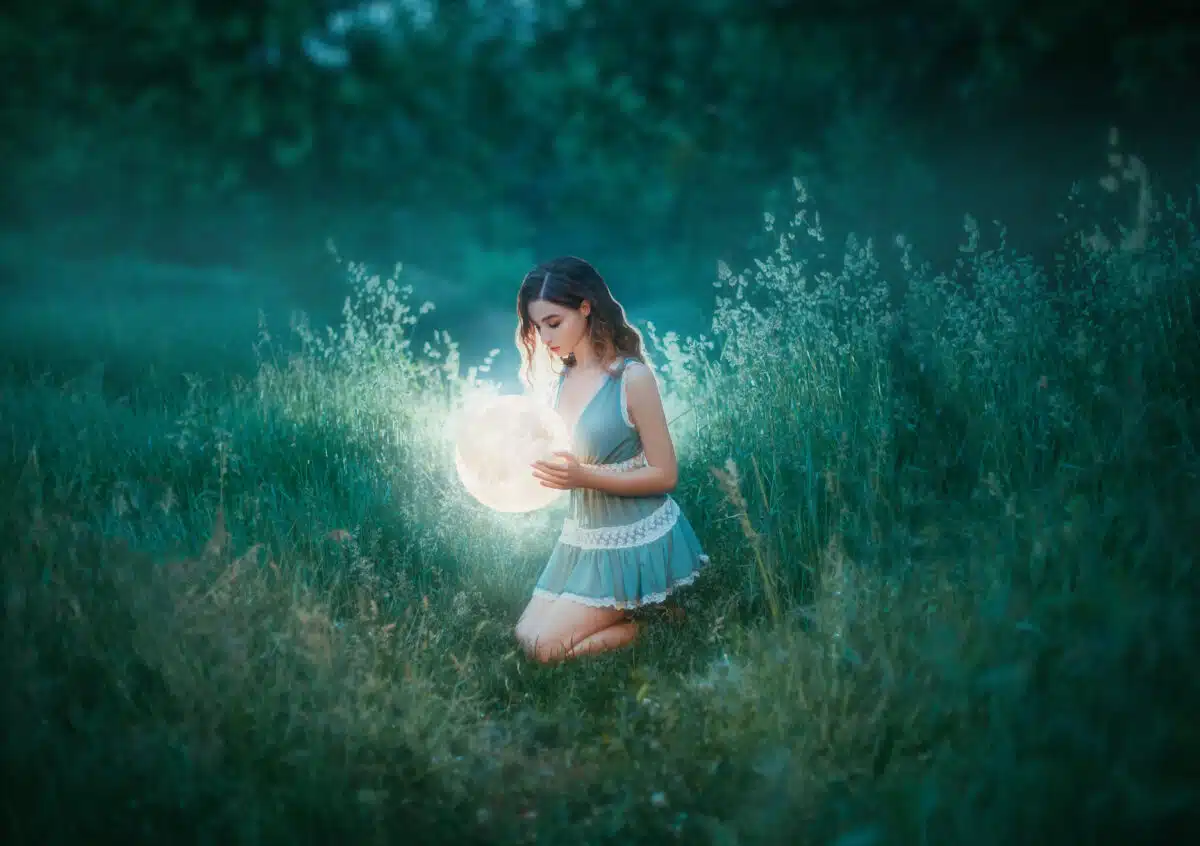
“Enchantment” by Lewis Grandison Alexander
Part I
Night
The moonlight:
Juice flowing from an over-ripe pomegranate
bursting
The cossack-crested palm trees:
motionless
The leopard spotted shade:
inciting fear
silence seeds sown. . .
Part II
Medicine Dance
A body smiling with black beauty
Leaping into the air
Around a grotesque hyena-faced monster:
The sorcerer—
A black body—dancing with beauty
Clothed in African moonlight,
Smiling more beauty into its body.
The hyena-faced monster yelps!
Echo!
Silence—
The dance
Leaps—
Twirls—
The twirling body comes to a fall
At the feet of the monster.
Yelps—
Wild—
Terror-filled—
Echo—
The hyena-faced monster jumps
starts,
runs,
chases his own yelps back to the wilderness.
The black body clothed in moonlight
Raises up its head,
Holding a face dancing with delight.
Terror reigns like a new crowned king.
Classic Poems About Moonlight
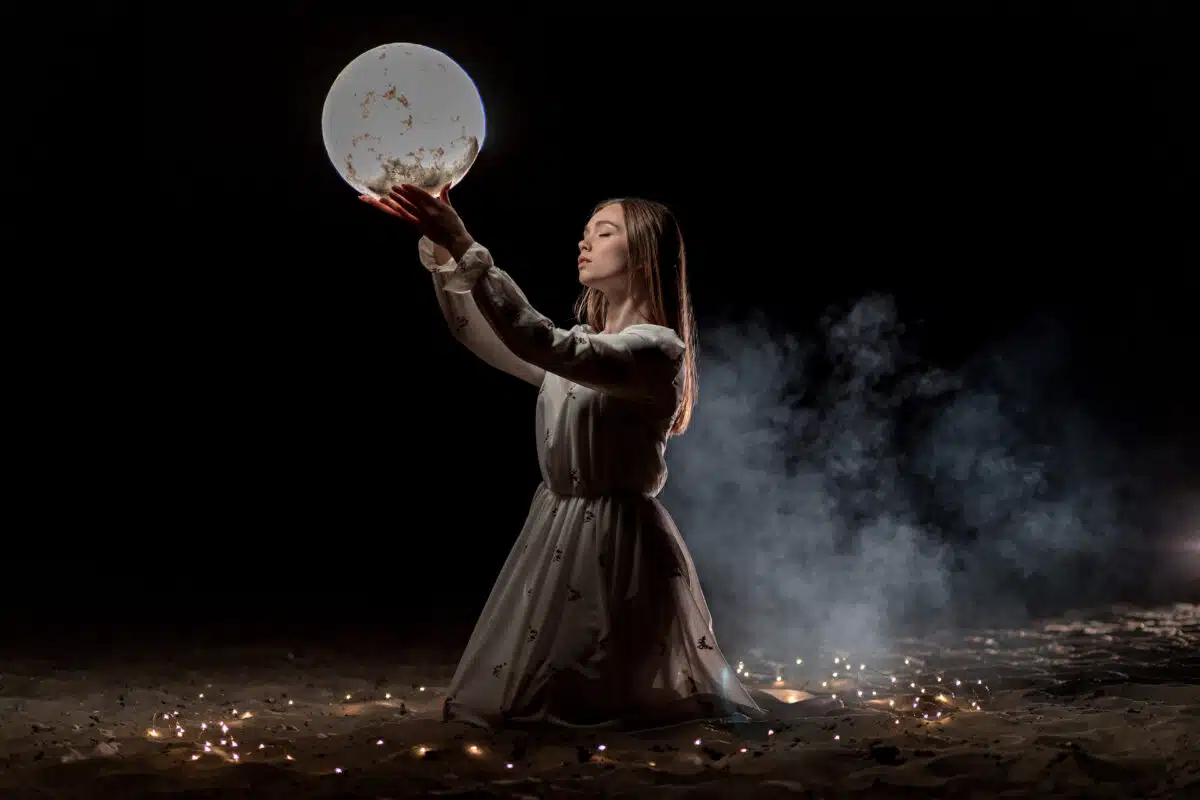
“Clair de Lune” by Ford Madox Ford
I.
I should like to imagine
A moonlight in which there would be no machine-guns!
For, it is possible
To come out of a trench or a hut or a tent or a church all in ruins:
To see the black perspective of long avenues
All silent.
The white strips of sky
At the sides, cut by the poplar trunks:
The white strips of sky
Above, diminishing—
The silence and blackness of the avenue
Enclosed by immensities of space
Spreading away
Over No Man’s Land….
For a minute…
For ten…
There will be no star shells
But the untroubled stars,
There will be no Very light
But the light of the quiet moon
Like a swan.
And silence….
Then, far away to the right thro’ the moonbeams
“Wukka Wukka” will go the machine-guns,
And, far away to the left
Wukka Wukka
And sharply,
Wuk…Wuk… and then silence
For a space in the clear of the moon.
Then, far away to the right thro’ the moonbeams
“Wukka Wukka” will go the machine-guns,
And, far away to the left
Wukka Wukka
And sharply,
Wuk…Wuk… and then silence
For a space in the clear of the moon.
II.
I should like to imagine
A moonlight in which the machine-guns of trouble
Will be silent….
Do you remember, my dear
Long ago, on the cliffs, in the moonlight,
Looking over to Flatholme
We sat….Long ago!…
And the things that you told me…
Little things in the clear of the moon,
The little, sad things of a life….
We shall do it again
Full surely,
Sitting still, looking over a Flatholme.
Then, far away to the right
Shall sound the Machine Guns of trouble
Wukka-wukka!
And, far away to the lft, under Flatholme,
Wukka-wuk!…
I wonder, my dear, can you stick it?
As we could say: “Stick it, the Welch!”
In the dark of the moon,
Going over….
“Moonlight” by John Crowe Ransom
He feigned a fine indifference
To be so prodigal of light,
Knowing his piteous twisted things
Would lose the crooked marks of spite
When only moonbeams lit the dusk
And made his wicked world seem right.
But we forget so soon the shame,
Conceiving sweetness if we can,
Heaven the citadel itself
Illumined on the lunar plan;
And I the chief of sinners, I
The middlemost Victorian!
Now I shall ride the misty lake
With my own love, and speak so low
That not a fishy thing shall hear
The secrets passing to and fro
Amid the moonlight poetries.
O moonshine, how unman us so?
“Harvest Moon” by George Marion McClellan
The dark magnolia leaves and spreading fig
With green luxuriant beauty all their own,
Stirless, hang heavy-coated with the dew,
Which swift and iridescent gleams shoot through
As if a thousand brilliant diamonds shone.
Afloat the lagoon, water-lilies white
In sweets with muscadines perfume the night.
A song bird restless chants a fleeting lay;
Asleep on all the swamp and bayou lies
A peaceful, blissful moonlight, mystic haze,
A dreaminess o’er all the landscape plays,
While lake and lagoon mirror all the skies.
There is a glory doomed to pass too soon,
That lies subdued beneath the harvest moon.
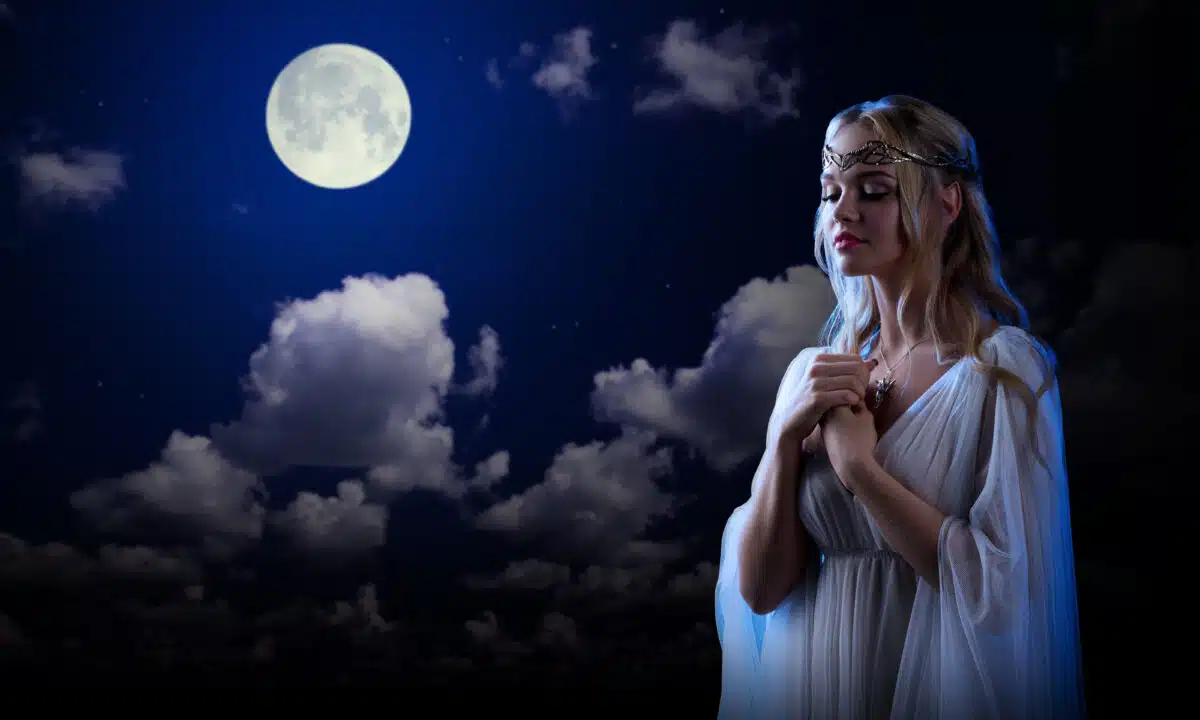
“A September Night” by George Marion McClellan
The full September moon sheds floods of light,
And all the bayou’s face is gemmed with stars,
Save where are dropped fantastic shadows down
From sycamores and moss-hung cypress trees.
With slumberous sound the waters half asleep
Creep on and on their way, ’twixt rankish reeds,
Through marsh and lowlands stretching to the Gulf.
Begirt with cotton fields, Anguilla sits
Half bird-like, dreaming on her Summer nest.
Amid her spreading figs and roses, still
In bloom with all their Spring and Summer hues,
Pomegranates hang with dapple cheeks full ripe,
And over all the town a dreamy haze
Drops down. The great plantations, stretching far
Away, are plains of cotton, downy white.
O, glorious is this night of joyous sounds;
Too full for sleep. Aromas wild and sweet,
From muscadine, late blooming jessamine,
And roses, all the heavy air suffuse.
Faint bellows from the alligators come
From swamps afar, where sluggish lagoons give
To them a peaceful home. The katydids
Make ceaseless cries. Ten thousand insects’ wings
Stir in the moonlight haze and joyous shouts
Of Negro song and mirth awake hard by
The cabin dance. O, glorious is this night!
The Summer sweetness fills my heart with songs,
I can not sing, with loves I can not speak.
“Under the Harvest Moon” by Carl Sandburg
Under the harvest moon,
When the soft silver
Drips shimmering
Over the garden nights,
Death, the gray mocker,
Comes and whispers to you
As a beautiful friend
Who remembers.
Under the summer roses
When the flagrant crimson
Lurks in the dusk
Of the wild red leaves,
Love, with little hands,
Comes and touches you
With a thousand memories,
And asks you
Beautiful, unanswerable questions.
“The Undying One, Canto I” by Caroline Elizabeth Sarah Norton
Moonlight is o’er the dim and heaving sea,—
Moonlight is on the mountain’s frowning brow,
And by their silvery fountains merrily
The maids of Castaly are dancing now.
Young hearts, bright eyes, and rosy lips are there,
And fairy steps, and light and laughing voices,
Ringing like welcome music through the air—
A sound at which the untroubled heart rejoices.
But there are hearts o’er which that dancing measure
Heavily falls!
And there are ears to which the voice of pleasure
Still vainly calls !
There’s not a scene on earth so full of lightness
That withering care
Sleeps not beneath the flowers, and turns their brightness
To dark despair!
Oh! Earth, dim Earth, thou canst not be our home;
Or wherefore look we still for joys to come?
The fairy steps are flown—the scene is still—
Nought mingles with the murmuring of the rill.
Nay, hush! it is a sound—a sigh—again!
It is a human voice—the voice of pain.
And beautiful is she, who sighs alone
Now that her young and playful mates are gone:
The dim moon, shining on her statue face,
Gives it a mournful and unearthly grace;
And she hath bent her gentle knee to earth;
And she hath raised her meek sad eyes to heaven—
As if in such a breast sin could have birth,
She clasps her hands, and sues to be forgiven.
Her prayer is over; but her anxious glance
Into the blue transparency of night
Seems as it fain would read the book of chance,
And fix the future hours, dark or bright.
A slow and heavy footstep strikes her ear—
What ails the gentle maiden?—Is it fear?
Lo! she hath lightly raised her from the ground,
And turn’d her small and stag-like head around;
Her pale cheek paler, and her lips apart,
Her bosom heaving o’er her beating heart:
And see, those thin white hands she raises now
To press the throbbing fever from her brow—
In vain—in vain! for never more shall rest
Find place in that young, fair, but erring breast!
He stands before her now—and who is he
Into whose outspread arms confidingly
She flings her fairy self?—Unlike the forms
That woo and win a woman’s love—the storms
Of deep contending passions are not seen
Darkening the features where they once have been,
Nor the bright workings of a generous soul,
Of feelings half conceal’d, explain the whole.
But there is something words cannot express—
A gloomy, deep, and quiet fixedness;
A recklessness of all the blows of fate—
A brow untouch’d by love, undimm’d by hate—
As if, in all its stores of crime and care,
Earth held no suffering now for him to bear.
Yes—all is passionless—the hollow cheek
Those pale thin lips shall never wreathe with smiles;
Ev’n now, ‘mid joy, unmoved and sad they speak
In spite of all his Linda’s winning wiles.
Yet can we read, what all the rest denies,
That he hath feelings of a mortal birth,
In the wild sorrow of those dark bright eyes,
Bent on that form—his one dear link to earth.
He loves—and he is loved! then what avail
The scornful words which seek to brand with shame?
Or bitterer still, the wild and fearful tale
Which couples guilt and horror with that name?
What boots it that the few who know him shun
To speak or eat with that unworthy one?
Were all their words of scorn and malice proved,
It matters not—he loves and he is loved!
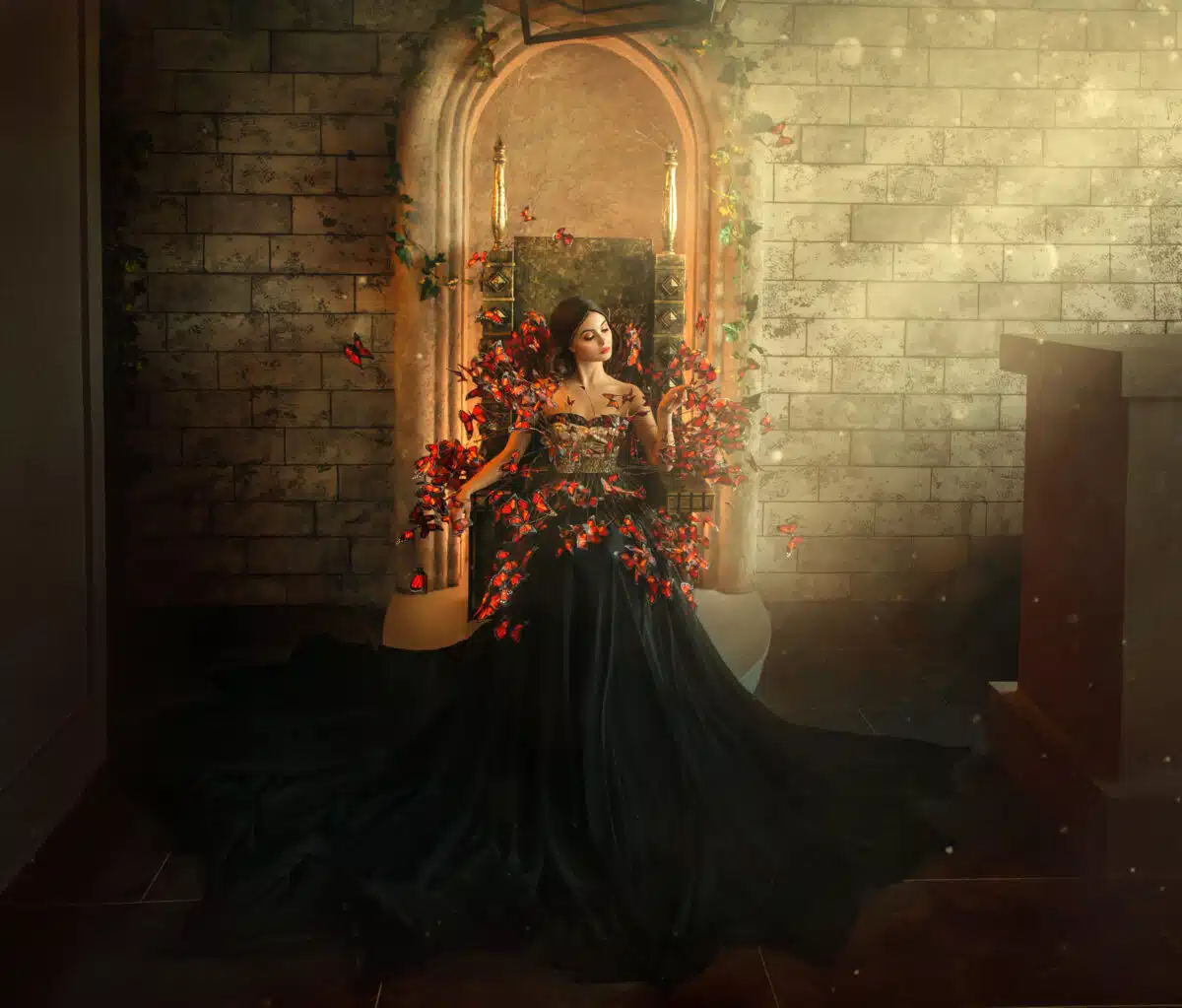
“Revery” by Fenton Johnson
1.
I was the starlight
I was the moonlight
I was the sunset,
Before the dawning
Of my life;
I was the river
Forever winding
To purple dreaming,
I was the glowing
Of youthful Springtime,
I was the singing
Of golden songbirds,—
I was love.
2.
I was the sunlight,
I was the twilight,
I was the humming
Of winged creatures
Ere my birth;
I was the blushing
Of lily maiden,
I was the vision
Of youthful striving,
I was the summer,
I was the autumn,
I was the All-time—
I was love.
“The Stolen Child” by W. B. Yeats
Where dips the rocky highland
Of Sleuth Wood in the lake,
There lies a leafy island
Where flapping herons wake
The drowsy water rats;
There we’ve hid our faery vats,
Full of berrys
And of reddest stolen cherries.
Come away, O human child!
To the waters and the wild
With a faery, hand in hand,
For the world’s more full of weeping than you can understand.
Where the wave of moonlight glosses
The dim gray sands with light,
Far off by furthest Rosses
We foot it all the night,
Weaving olden dances
Mingling hands and mingling glances
Till the moon has taken flight;
To and fro we leap
And chase the frothy bubbles,
While the world is full of troubles
And anxious in its sleep.
Come away, O human child!
To the waters and the wild
With a faery, hand in hand,
For the world’s more full of weeping than you can understand.
Where the wandering water gushes
From the hills above Glen-Car,
In pools among the rushes
That scarce could bathe a star,
We seek for slumbering trout
And whispering in their ears
Give them unquiet dreams;
Leaning softly out
From ferns that drop their tears
Over the young streams.
Come away, O human child!
To the waters and the wild
With a faery, hand in hand,
For the world’s more full of weeping than you can understand.
Away with us he’s going,
The solemn-eyed:
He’ll hear no more the lowing
Of the calves on the warm hillside
Or the kettle on the hob
Sing peace into his breast,
Or see the brown mice bob
Round and round the oatmeal chest.
For he comes, the human child,
To the waters and the wild
With a faery, hand in hand,
For the world’s more full of weeping than he can understand.
“The Village Street” by Edgar Allan Poe
In these rapid, restless shadows,
Once I walked at eventide,
When a gentle, silent maiden,
Walked in beauty at my side
She alone there walked beside me
All in beauty, like a bride.
Pallidly the moon was shining
On the dewy meadows nigh;
On the silvery, silent rivers,
On the mountains far and high
On the ocean’s star-lit waters,
Where the winds a-weary die.
Slowly, silently we wandered
From the open cottage door,
Underneath the elm’s long branches
To the pavement bending o’er;
Underneath the mossy willow
And the dying sycamore.
With the myriad stars in beauty
All bedight, the heavens were seen,
Radiant hopes were bright around me,
Like the light of stars serene;
Like the mellow midnight splendor
Of the Night’s irradiate queen.
Audibly the elm-leaves whispered
Peaceful, pleasant melodies,
Like the distant murmured music
Of unquiet, lovely seas:
While the winds were hushed in slumber
In the fragrant flowers and trees.
Wondrous and unwonted beauty
Still adorning all did seem,
While I told my love in fables
‘Neath the willows by the stream;
Would the heart have kept unspoken
Love that was its rarest dream!
Instantly away we wandered
In the shadowy twilight tide,
She, the silent, scornful maiden,
Walking calmly at my side,
With a step serene and stately,
All in beauty, all in pride.
Vacantly I walked beside her.
On the earth mine eyes were cast;
Swift and keen there came unto me
Ritter memories of the past
On me, like the rain in Autumn
On the dead leaves, cold and fast.
Underneath the elms we parted,
By the lowly cottage door;
One brief word alone was uttered
Never on our lips before;
And away I walked forlornly,
Broken-hearted evermore.
Slowly, silently I loitered,
Homeward, in the night, alone;
Sudden anguish bound my spirit,
That my youth had never known;
Wild unrest, like that which cometh
When the Night’s first dream hath flown.
Now, to me the elm-leaves whisper
Mad, discordant melodies,
And keen melodies like shadows
Haunt the moaning willow trees,
And the sycamores with laughter
Mock me in the nightly breeze.
Sad and pale the Autumn moonlight
Through the sighing foliage streams;
And each morning, midnight shadow,
Shadow of my sorrow seems;
Strive, O heart, forget thine idol!
And, O soul, forget thy dreams!
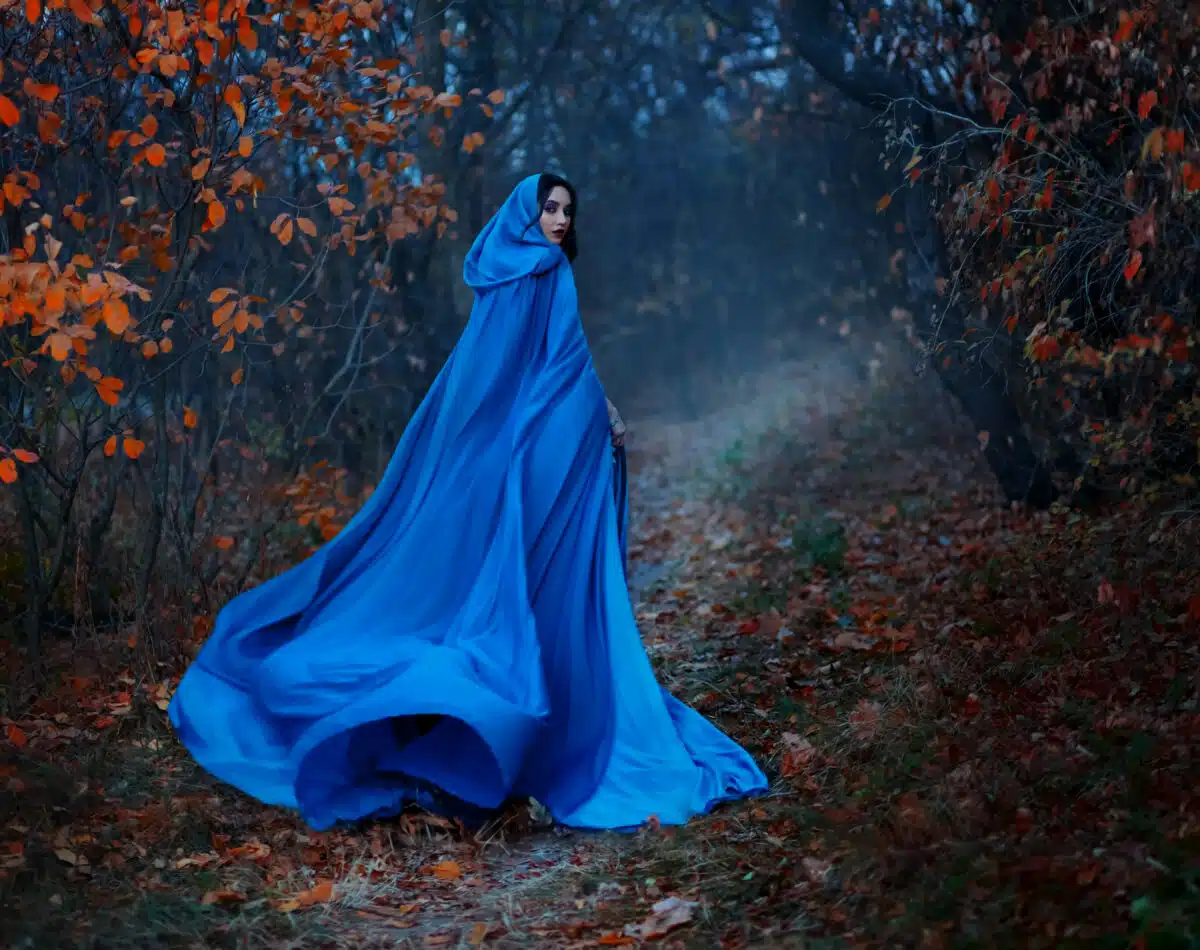
“The Walk at Midnight” by Alfred Lord Tennyson
Soft, shadowy moon-beam! by the light
Sleeps the wide meer serenely pale:
How various are the sounds of night,
Borne on the scarely-rising gale!
The swell of distant brook is heard,
Whose far-off waters faintly roll;
And piping of the shrill small bird,
Arrested by the wand’ring owl.
Come hither! let us thread with care
The maze of this green path, which binds
The beauties of the broad parterre,
And thro’ yon fragrant alley winds.
Or on this old bench will we sit,
Round which the clust’ring woodine wreathes;
While birds of night around us flit;
And thro’ each lavish wood-walk breathes,
Unto my ravish’d senses, brought
From yon thick-woven odorous bowers,
The still rich breeze, with incense fraught
Of glowing fruits and spangled flowers.
The whispering leaves, the gushing stream,
Where trembles the uncertain moon,
Suit more the poet’s pensive dream,
Than all the jarring notes of noon.
Then, to the thickly-crowded mart
The eager sons of interest press;
Then, shine the tinsel works of art’
Now, all is Nature’s loneliness!
Then, wealth aloft in state displays
The glittering of her gilded cars;
Now, dimly stream the mingled rays
Of yon far-twinkling, silver stars.
Yon church, whose cold grey spire appears
In the black outline of the trees,
Conceals the object of my tears,
Whose form in dreams my spirit sees.
There in the chilling bed of earth,
The chancel’s letter’d stone above’
There sleepeth she who gave me birth,
Who taught my lips the hymn of love!
How oft the grassy way I’ve trod
That winds their knotty boles between,
And gather’d from the blooming sod
The flowers that flourish’d there unseen!
Rise! let us trace that path once more,
While o’er our track the cold beams shine;
Down this low shingly vale, and o’er
Yon rude rough bridge of prostrate pine.
“DIYA (From the original Greek)” by Amy Lowell
Look, Dear, how bright the moonlight is to-night!
See where it casts the shadow of that tree
Far out upon the grass. And every gust
Of light night wind comes laden with the scent
Of opening flowers which never bloom by day:
Night-scented stocks, and four-o’clocks, and that
Pale yellow disk, upreared on its tall stalk,
The evening primrose, comrade of the stars.
It seems as though the garden which you love
Were like a swinging censer, its incense
Floating before us as a reverent act
To sanctify and bless our night of love.
Tell me once more you love me, that ‘t is you
Yes, really you, I touch, so, with my hand;
And tell me it is by your own free will
That you are here, and that you like to be
Just here, with me, under this sailing pine.
I need to hear it often for my heart
Doubts naturally, and finds it hard to trust.
Ah, Dearest, you are good to love me so,
And yet I would not have it goodness, rather
Excess of selfishness in you to need
Me through and through, as flowers need the sun.
I wonder can it really be that you
And I are here alone, and that the night
Is full of hours, and all the world asleep,
And none can call to you to come away;
For you have given all yourself to me
Making me gentle by your willingness.
Has your life too been waiting for this time,
Not only mine the sharpness of this joy?
Dear Heart, I love you, worship you as though
I were a priest before a holy shrine.
I’m glad that you are beautiful, although
Were you not lovely still I needs must love;
But you are all things, it must have been so
For otherwise it were not you. Come, close;
When you are in the circle of my arm
Faith grows a mountain and I take my stand
Upon its utmost top. Yes, yes, once more
Kiss me, and let me feel you very near
Wanting me wholly, even as I want you.
Have years behind been dark? Will those to come
Bring unguessed sorrows into our two lives?
What does it matter, we have had to-night!
To-night will make us strong, for we believe
Each in the other, this is a sacrament.
Beloved, is it true?
“Nocturne” by Virna Sheard
Infold us with thy peace, dear moon-lit night,
And let thy silver silence wrap us round
Till we forget the city’s dazzling light,
The city’s ceaseless sound.
Here where the sand lies white upon the shore,
And little velvet-fingered breezes blow,
Dear sea, thy world-old wonder-song once more
Sing to us e’er we go.
Give us thy garnered sweets, short summer hour:
Perfume of rose, and balm of sun-steeped pine;
Scent from the lily’s cup and horned flower,
Where bees have drained the wine.
Come, small musicians in the rough sea grass,
Pipe us the serenade we love the best;
And winds of midnight, chant for us a mass,
Our hearts would be at rest.
God of all beauty, though the world is thine,
Our faith grows often faint, oft hope is spent;
Show us Thyself in all things fair and fine,
Teach us the stars’ content.
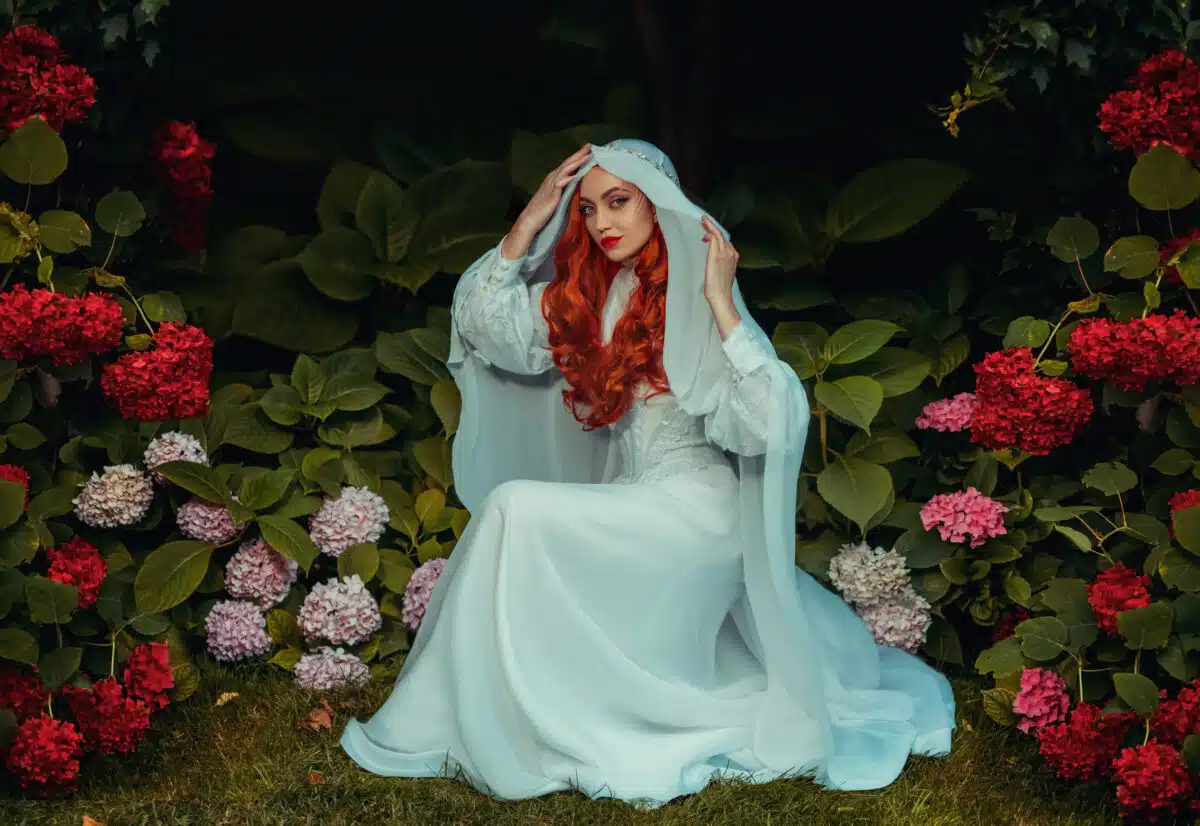
“Evening Solace” by Charlotte Brontë
The human heart has hidden treasures,
In secret kept, in silence sealed;—
The thoughts, the hopes, the dreams, the pleasures,
Whose charms were broken if revealed.
And days may pass in gay confusion,
And nights in rosy riot fly,
While, lost in Fame’s or Wealth’s illusion,
The memory of the Past may die.
But there are hours of lonely musing,
Such as in evening silence come,
When, soft as birds their pinions closing,
The heart’s best feelings gather home.
Then in our souls there seems to languish
A tender grief that is not woe;
And thoughts that once wrung groans of anguish
Now cause but some mild tears to flow.
And feelings, once as strong as passions,
Float softly back—a faded dream;
Our own sharp griefs and wild sensations,
The tale of others’ sufferings seem.
Oh! when the heart is freshly bleeding,
How longs it for that time to be,
When, through the mist of years receding,
Its woes but live in reverie!
And it can dwell on moonlight glimmer,
On evening shade and loneliness;
And, while the sky grows dim and dimmer,
Feel no untold and strange distress—
Only a deeper impulse given
By lonely hour and darkened room,
To solemn thoughts that soar to heaven
Seeking a life and world to come.
“Moonset” by Henry John Newbolt, Sir
Past seven o’clock: time to be gone;
Twelfth-night’s over and dawn shivering up:
A hasty cut of the loaf, a steaming cup,
Down to the door, and there is Coachman John.
Ruddy of cheek is John and bright of eye;
But John it appears has none of your grins and winks;
Civil enough, but short: perhaps he thinks:
Words come once in a mile, and always dry.
Has he a mind or not? I wonder; but soon
We turn through a leafless wood, and there to the right,
Like a sun bewitched in alien realms of night,
Mellow and yellow and rounded hangs the moon.
Strangely near she seems, and terribly great:
The world is dead: why are we travelling still?
Nightmare silence grips my struggling will;
We are driving for ever and ever to find a gate.
“When you come to consider the moon,” says John at last,
And stops, to feel his footing and take his stand;
“And then there’s some will say there’s never a hand
That made the world!”
A flick, and the gates are passed.
Out of the dim magical moonlit park,
Out to the workday road and wider skies:
There’s a warm flush in the East where day’s to rise,
And I’m feeling the better for Coachman John’s remark.
“The Offended Moon” by Sir John Collings Squire
O moon, O lamp of hill and secret dale!
Thou whom our fathers, ages out of mind,
Worshipped in thy blue heaven, whilst behind
Thy stars streamed after thee a glittering trail,
Dost see the poet, weary-eyed and pale,
Or lovers on their happy beds reclined,
Showing white teeth in sleep, or vipers twined,
‘Neath the dry sward; or in a golden veil
Stealest thou with faint footfall o’er the grass
As of old, to kiss from twilight unto dawn
The faded charms of thine Endymion?…
“O child of this sick century, I see
Thy grey-haired mother leering in her glass
And plastering the breast that suckled thee!”
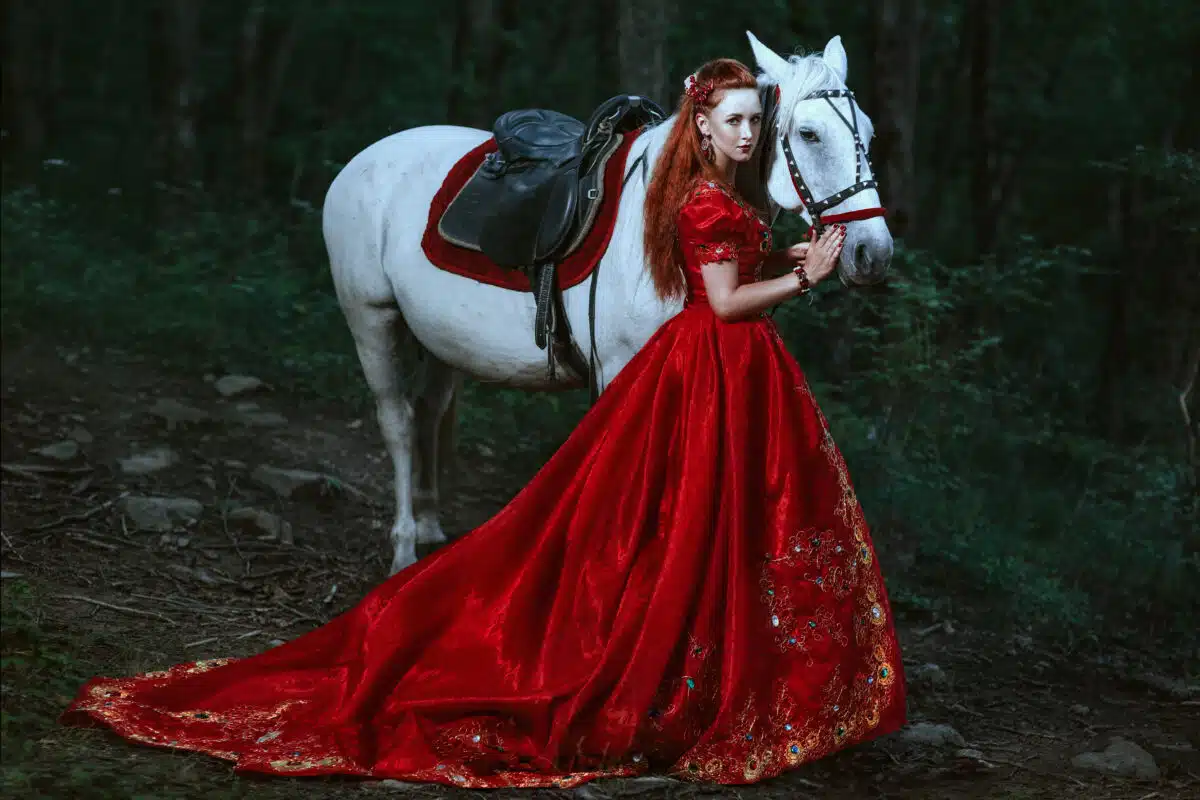
“The Listeners” by Walter de la Mare
‘Is there anybody there?’ said the Traveller,
Knocking on the moonlit door;
And his horse in the silence champed the grasses
Of the forest’s ferny floor:
And a bird flew up out of the turret,
Above the Traveller’s head:
And he smote upon the door again a second time;
‘Is there anybody there?’ he said.
But no one descended to the Traveller;
No head from the leaf-fringed sill
Leaned over and looked into his grey eyes,
Where he stood perplexed and still.
But only a host of phantom listeners
That dwelt in the lone house then
Stood listening in the quiet of the moonlight
To that voice from the world of men:
Stood thronging the faint moonbeams on the dark stair,
That goes down to the empty hall,
Hearkening in an air stirred and shaken
By the lonely Traveller’s call.
And he felt in his heart their strangeness,
Their stillness answering his cry,
While his horse moved, cropping the dark turf,
’Neath the starred and leafy sky;
For he suddenly smote on the door, even
Louder, and lifted his head:—
‘Tell them I came, and no one answered,
That I kept my word,’ he said.
Never the least stir made the listeners,
Though every word he spake
Fell echoing through the shadowiness of the still house
From the one man left awake:
Ay, they heard his foot upon the stirrup,
And the sound of iron on stone,
And how the silence surged softly backward,
When the plunging hoofs were gone.
“Moonlight, Summer Moonlight” by Emily Bronte
‘Tis moonlight, summer moonlight,
All soft and still and fair;
The solemn hour of midnight
Breathes sweet thoughts everywhere,
But most where trees are sending
Their breezy boughs on high,
Or stooping low are lending
A shelter from the sky.
And there in those wild bowers
A lovely form is laid;
Green grass and dew-steeped flowers
Wave gently round her head.

